Travels with Dick and Karen
South Africa
Part 3
Tree Tops and Surf:
east of Cape Town
to
Port Elizabeth
|
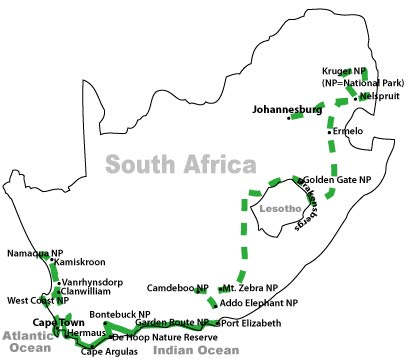 |
| At Strand we hit the sea again. High-rises on one side of Beach Road, and.... |
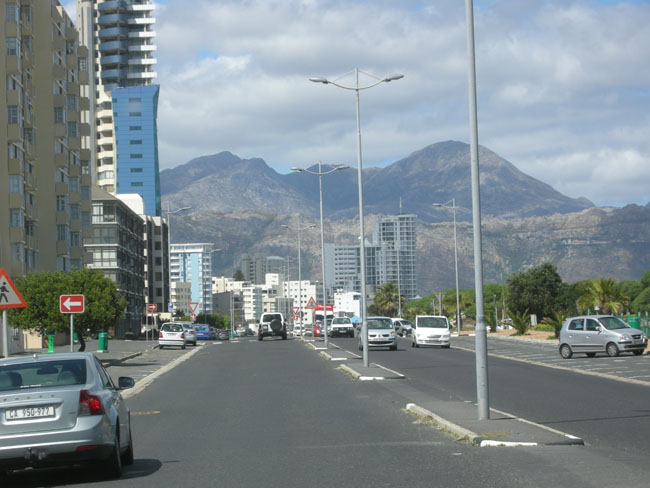 |
| ... across the road is a wide sweeping beach. Under-populated on this early spring day but apparently thronged in the summer. Without a warm current, the water here in False Bay is about as cold as it is back home in Washington state. Surfing is done with wetsuits until you get around to the warmer Indian Ocean on the east side of the country. |
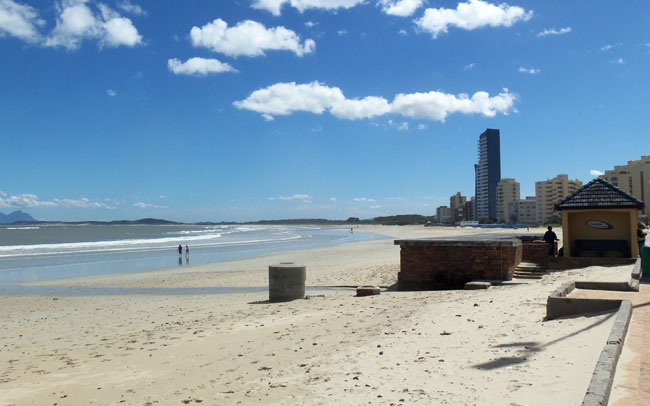 |
So we watched the waves and tried to get photos for Karen's projected wave table. That ridge in the distance is Cape Point, the peninsula leading to the Cape of Good Hope. |
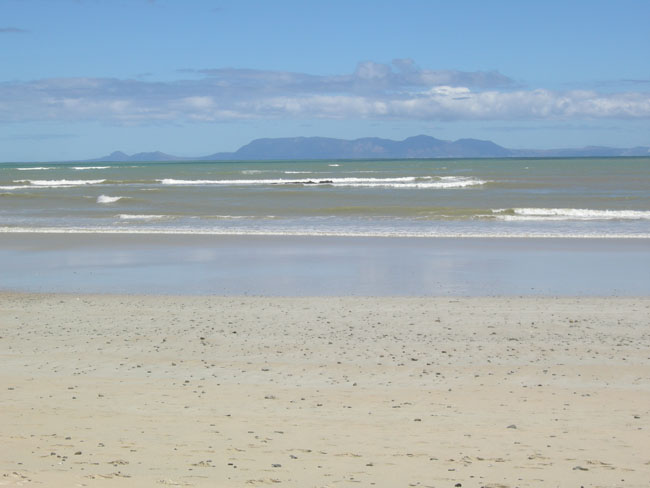 |
| A bit further west and south along the R44 past Gordons Bay, more mountains meet the coast in the Kogelberg Nature Reserve. This broad bricked pull-off is a whale watching lookout. |
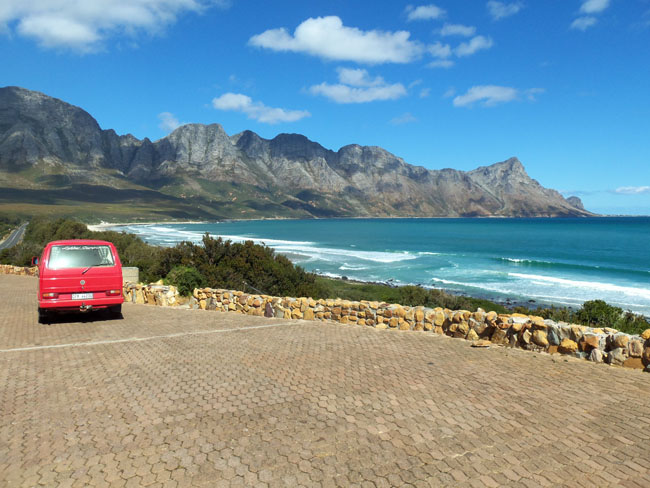 |
| The road ducked inland to avoid that rocky stretch, then returned to the water at Betty's Bay. There, at the Stony Point Nature Reserve, we found sun-warmed rocks. And therefore we found dassies... |
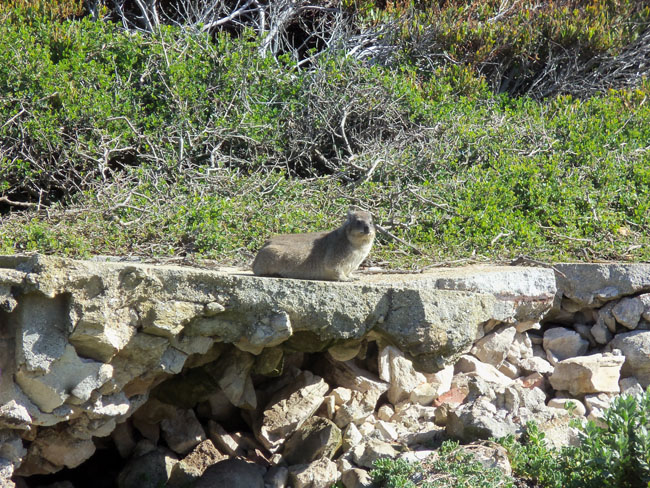 |
| ... properly described. |
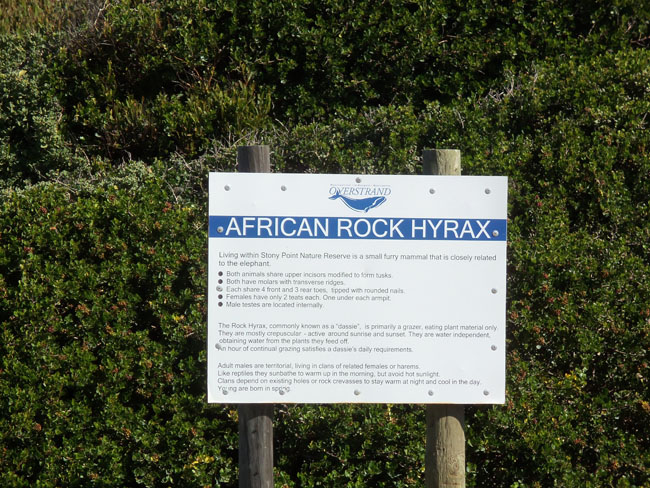 |
| And one of the few mainland penguin colonies. There is a boardwalk to keep the people elevated above the beach. |
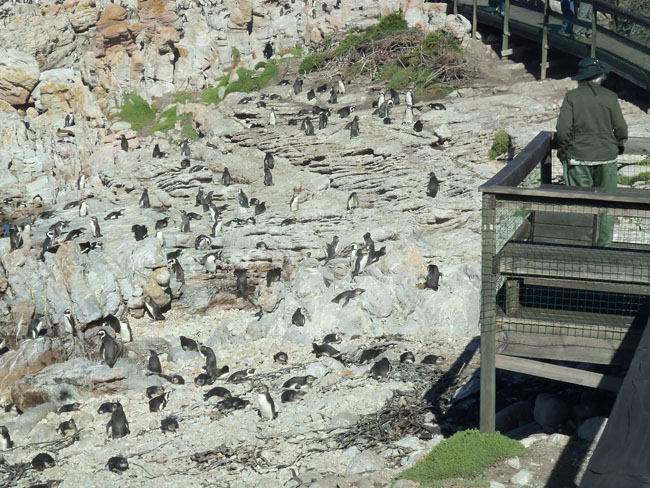 |
So the birds can waddle between the sea ... |
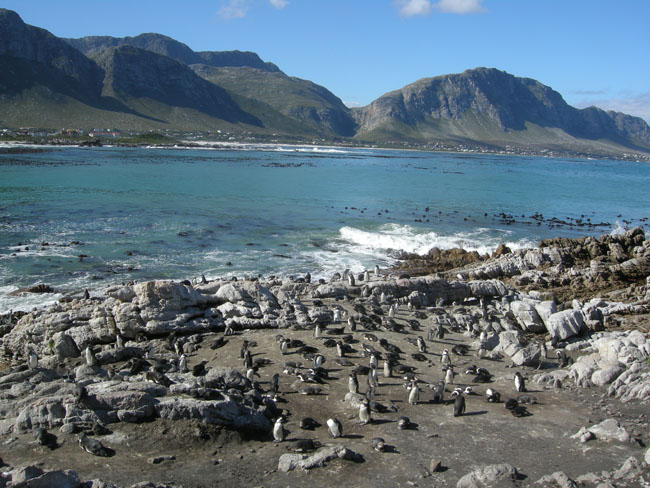 |
...and their burrows on the other side of the boardwalk.
Many of the burrows were in short chunks of plastic drain pipe embedded in the sand for their use. |
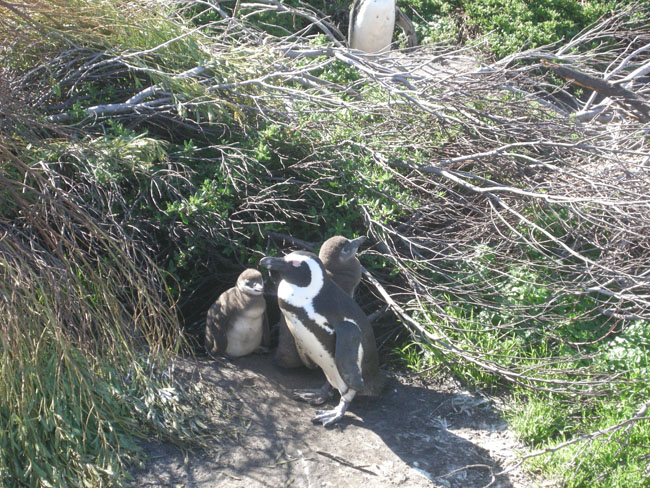 |
Some of them were very photogenic |
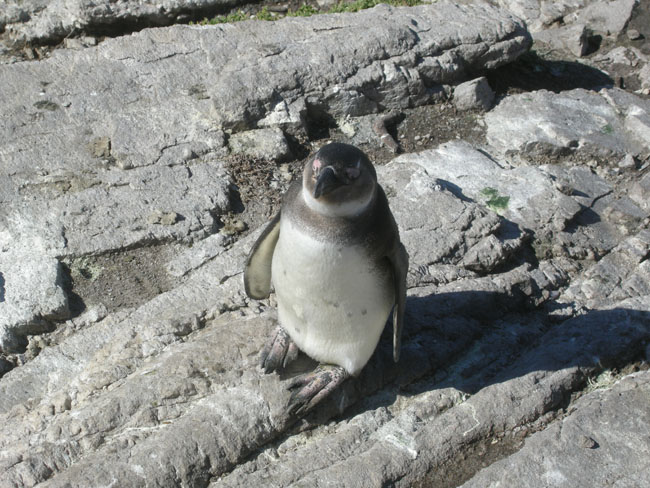 |
| As were their companions |
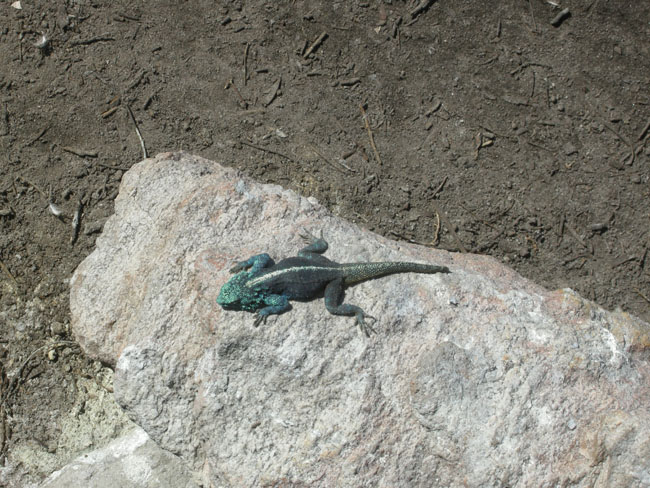 |
| Beyond (and above) the penguins, comorants had a colony. |
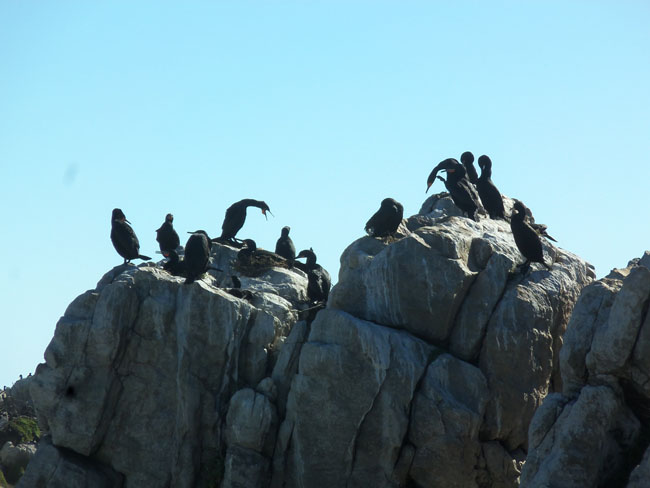 |
| Just west of Betty's Bay was yet another botanical garden, the Harold Porter. This one had a waterfall in the far background. |
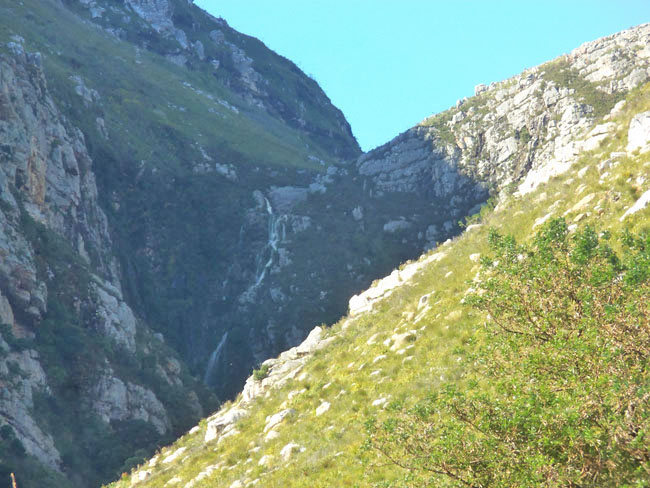 |
| And lots of proteas, many of which I hadn't seen before: |
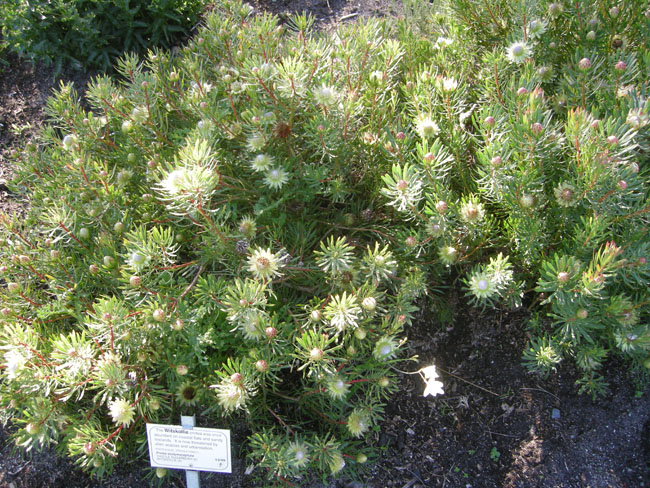 |
| |
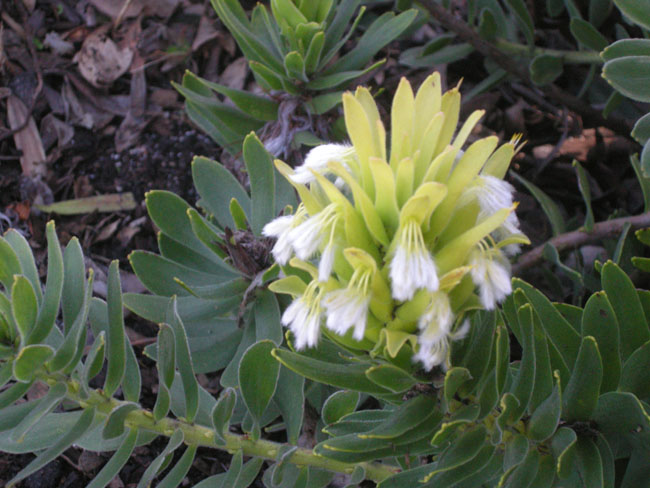 |
| |
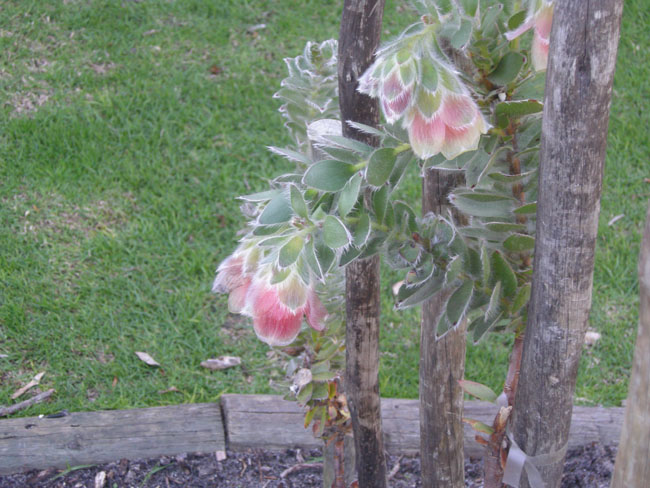 |
| |
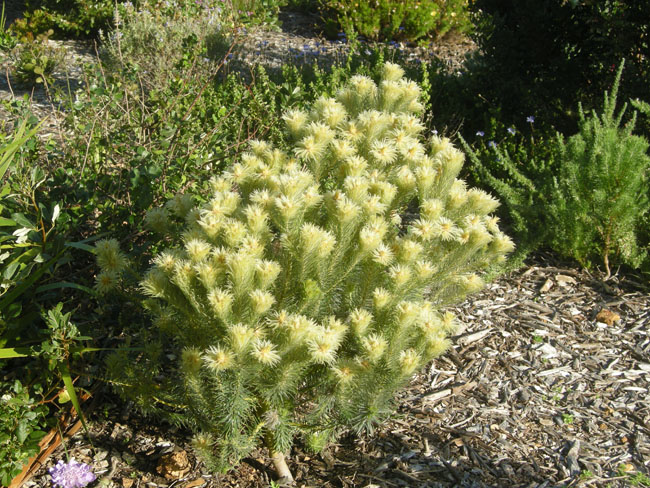 |
| |
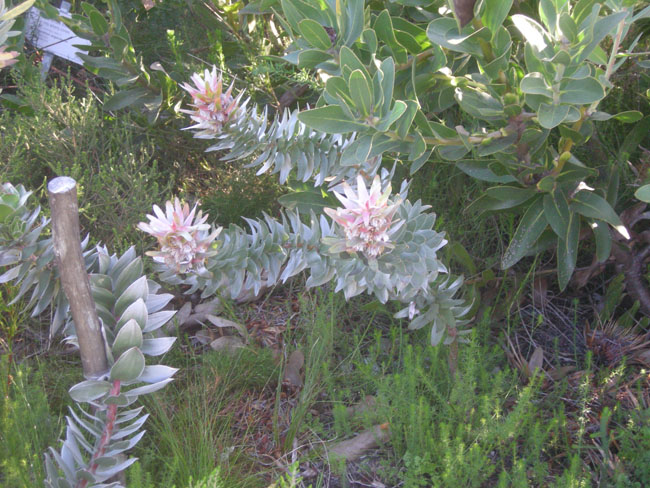 |
| |
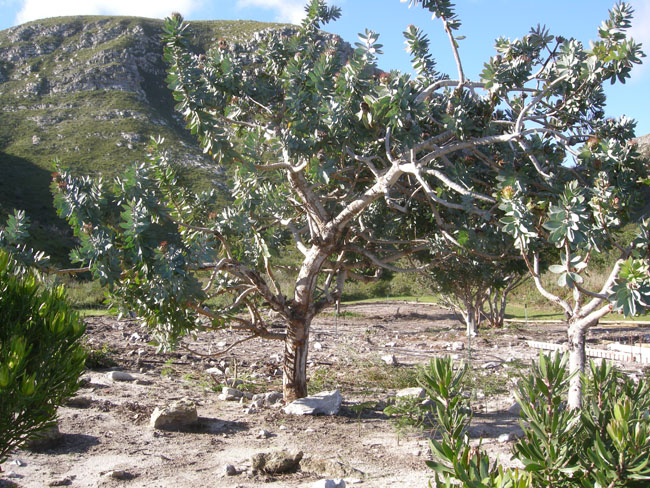 |
So we pressed on to Kleinmond's Palmiet Caravan Park to camp at the beach. Once again, we were the only occupants of a 109-site park. |
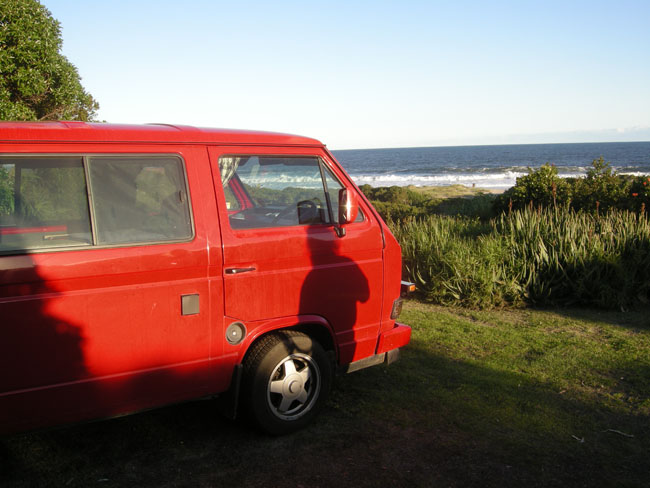 |
Even the campground had proteas. These lovely cone flowers are a garden cultivar and don't usually appear so bright in nature. |
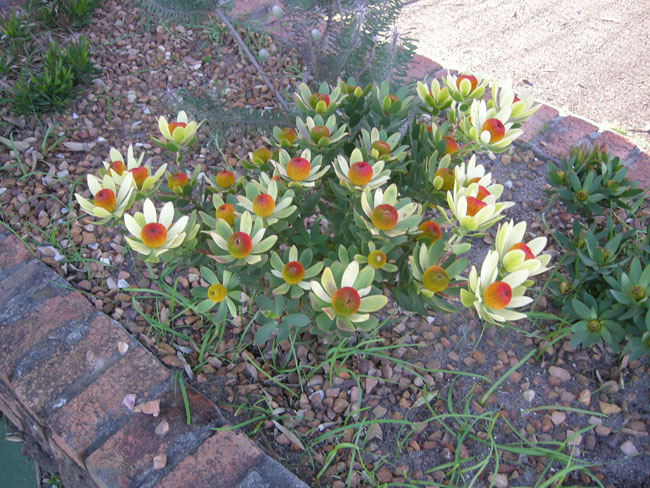 |
| Well, we thought we could access the beach. Since it was late in the day, the gates in the barbed wire fencing that secured the park from the beach were locked. So we strolled the paths through the campground. |
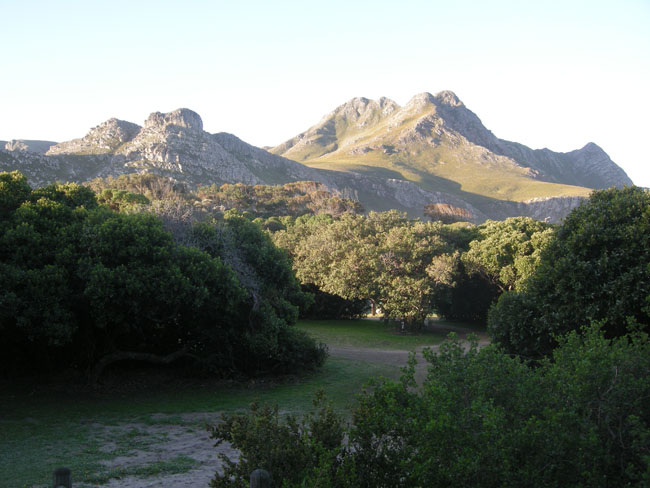 |
| And looked at the twisted trees that lined the back of the dunes instead. |
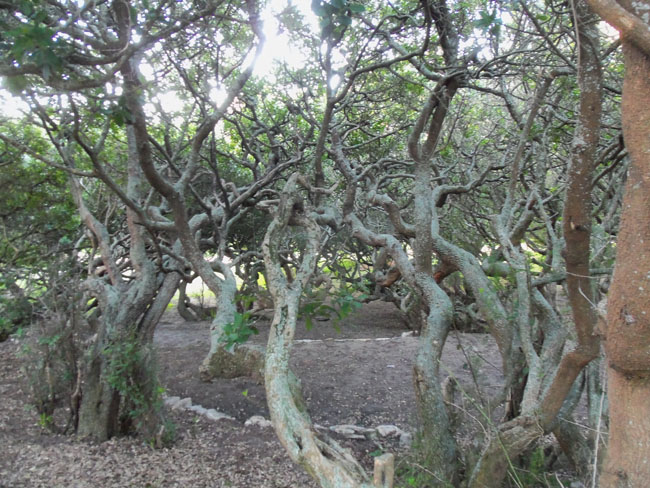 |
| One of the locals gave us a looking-at too. |
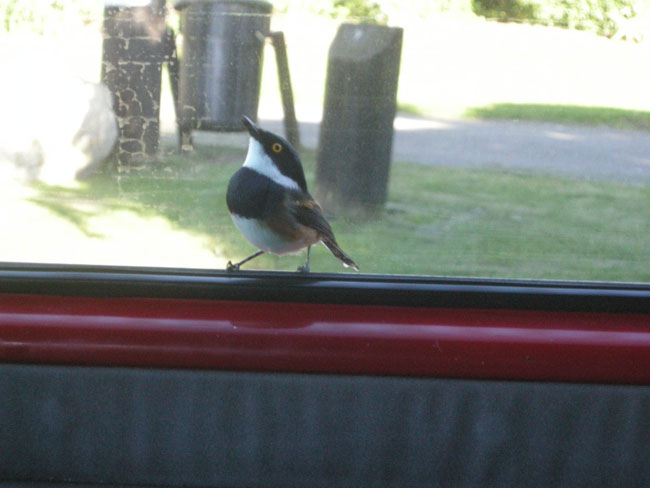 |
| In town the next day Dick was amused by the ads for the Crazy store. |
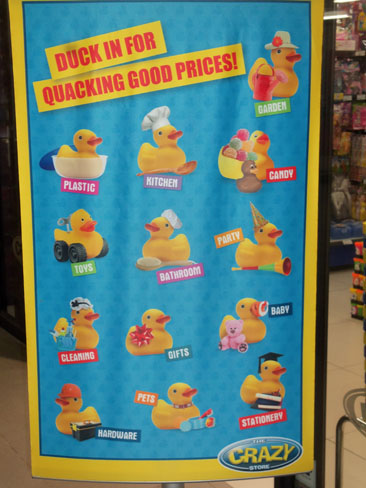 |
| After getting groceries we stopped along the water in Hemanus for some whale watching and general touristing. |
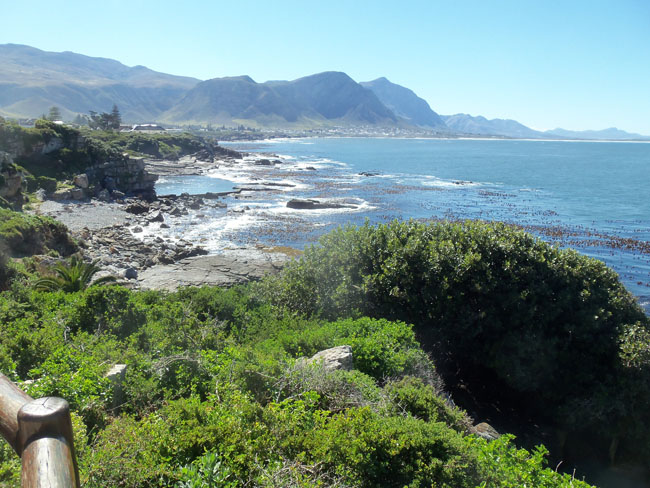 |
| There is a whale out there but it doesn't show up here. |
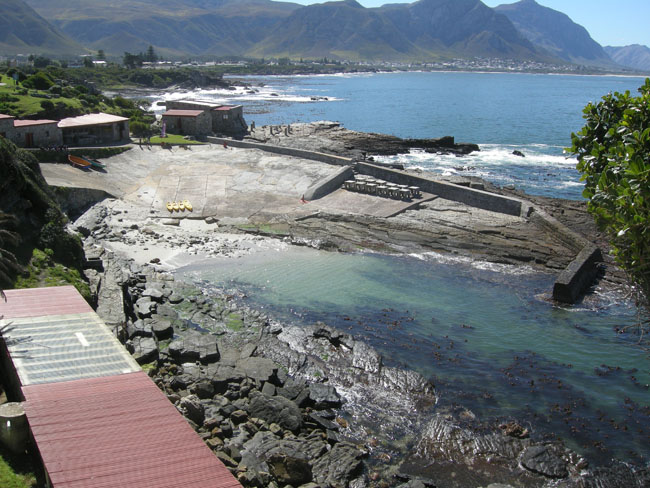 |
| But the dassie does |
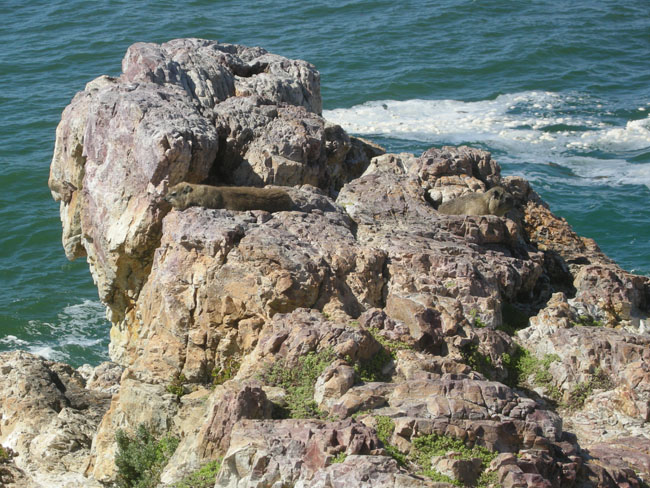 |
| Karen liked the Hermanus crafts mall. A metal artist named Patrone sold her an ogling ostrich. His warthogs and other animals were cute too but we wanted to avoid too much of a sharp-edged packing problem (and the paint was still wet). |
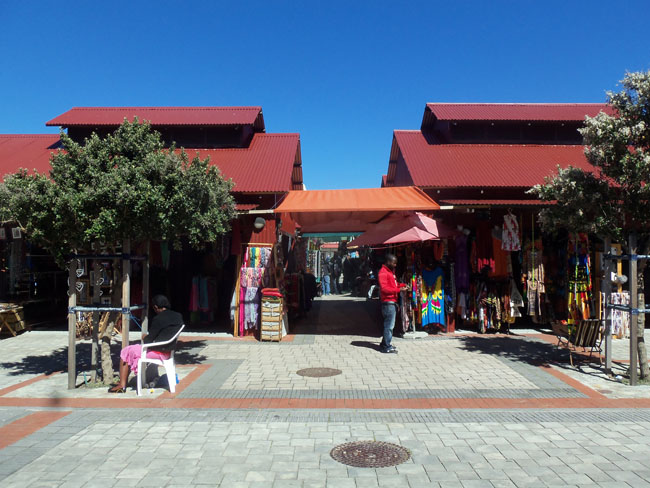 |
Another harbor, down the coast near Gansbaai.
The untarred road we'd planned to take was closed (possibly being tarred). So we backtracked a bit and headed inland to drive across the middle of the chunk of land forming the head of Cape Agulhas. |
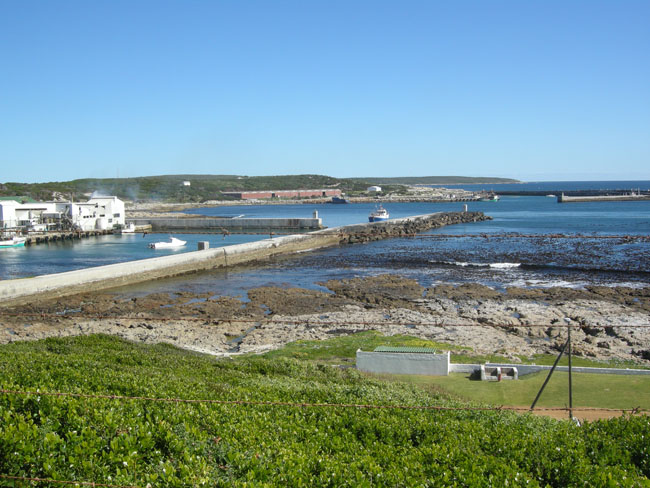 |
| Crossing over the headland, we dropped in on a number of towns and townships... |
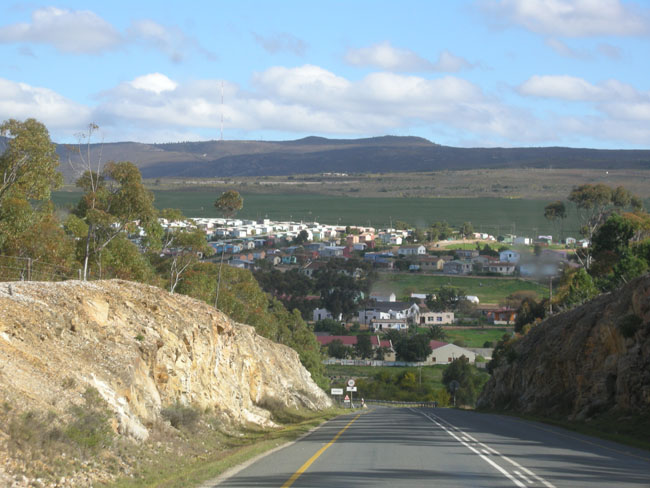 |
| ...separated by vast tracts of agriculture... including entire fields covered for shade-grown crops. |
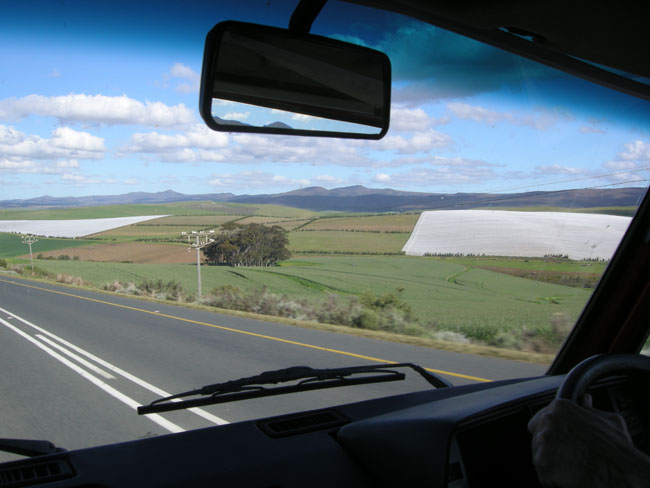
|
| Turning south at Bredasdorp, we finally reached Cape Agulhas, the true southernmost point of Africa... |
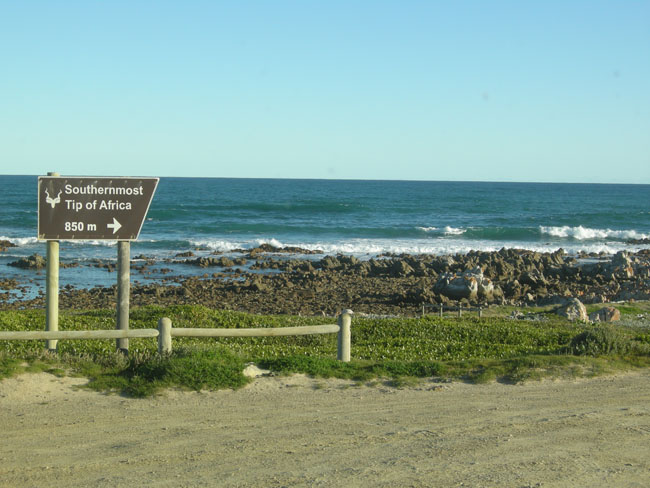 |
... almost. There was a boardwalk from the parking lot to keep the tourists from crushing the vegetation. |
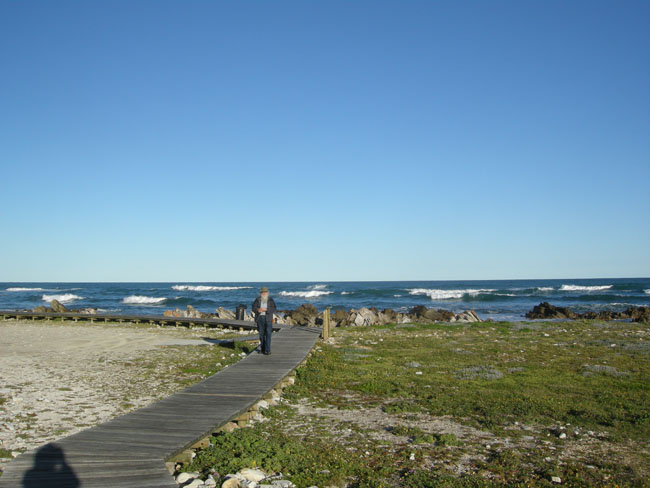 |
Remember the beefy expedition vehicle 'way back in Kamieskroon?
(Let's see... a whole 6 days ago)
Here's a much more modest beastie that had come from London. It took the young couple in it a full year. They'd made it to Cape Town and were wondering what to do next. They offered to sell us the van to drive home to Seattle (via Argentina?) but that would have cut into too much of Karen's glass time. |
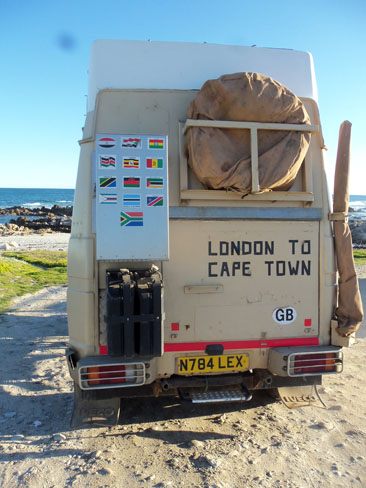 |
And we've reached another "end of the world".
Due south is nothing until Antarctica. On the left the "warm" Indian Ocean, and to the right the cold Atlantic. |
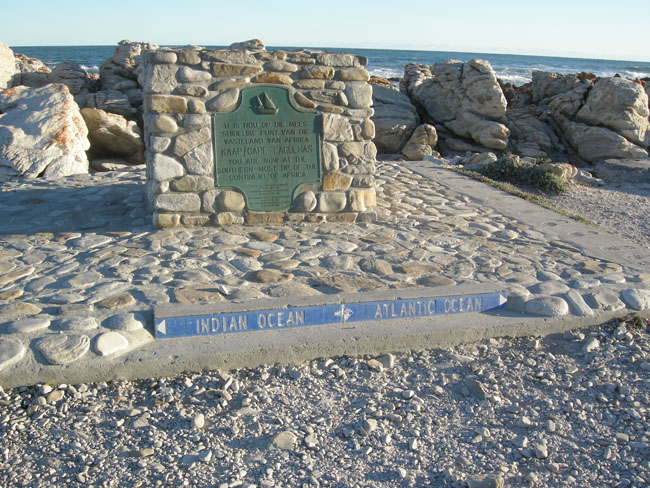 |
| One of Karen's favorite images from the trip. |
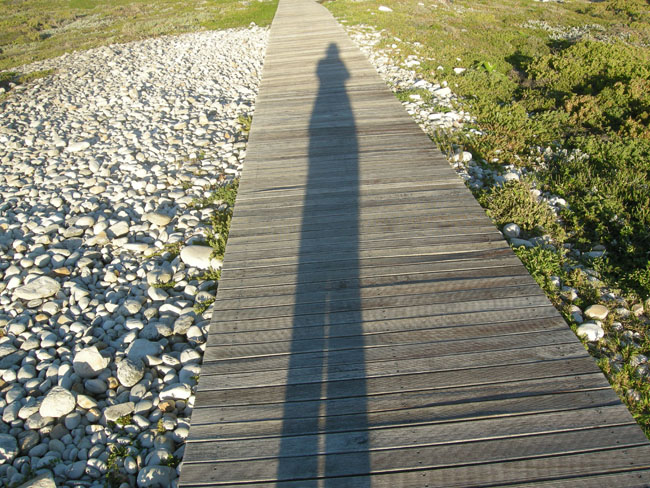 |
| The Cape Agulhas lighthouse was undergoing reconstruction, seemingly from the middle to both ends. |
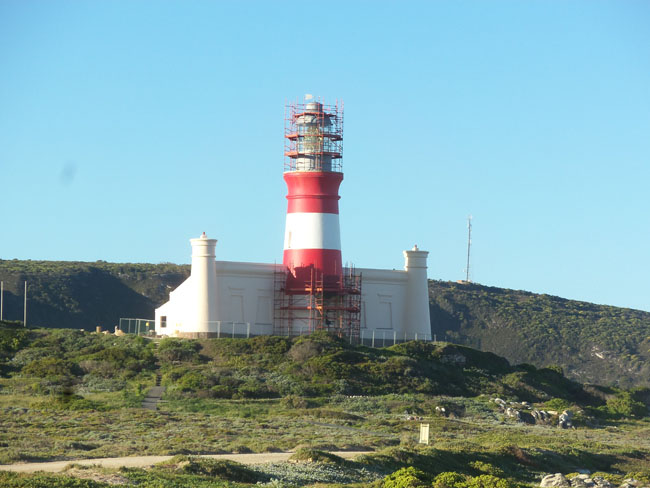 |
| "You are here." |
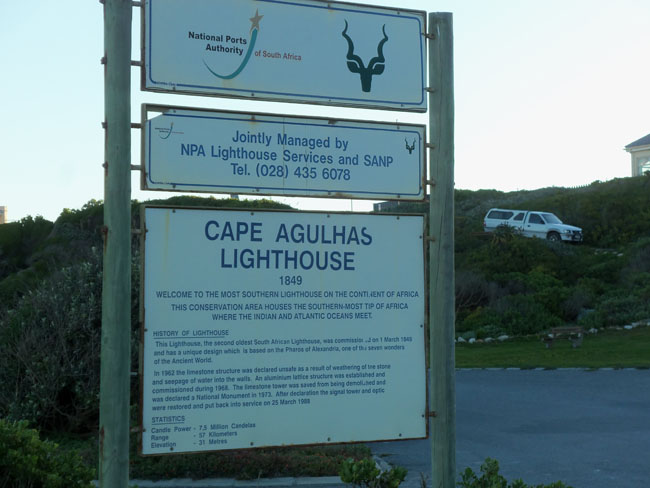 |
The adjacent town retains its Portugese name of L'Agulhas. ("Needles", since compass needles pointed due true north here in 1500)
At the middle-of-town municipal campground the lighthouse construction wasn't so apparent.
|
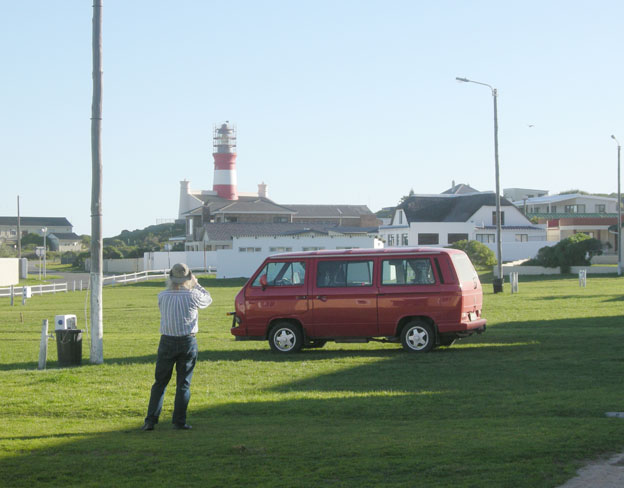 |
| The shells at the beach were profuse and still intact. |
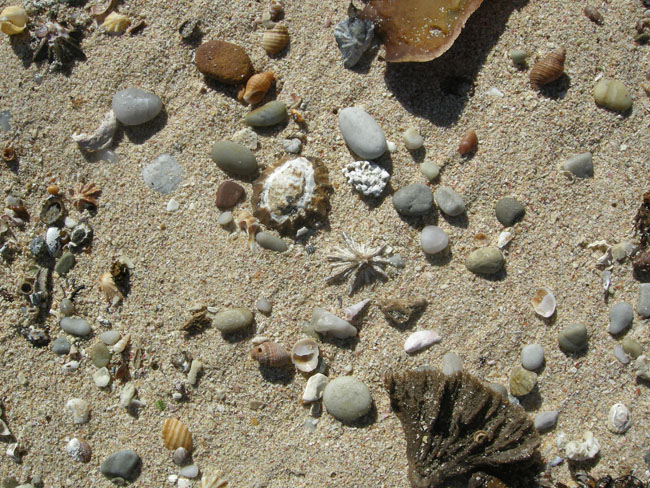 |
| SouthAfrica still has an active train system, including the famous luxury "Blue Train" between Pretoria and Cape Town. This freight train was brown. |
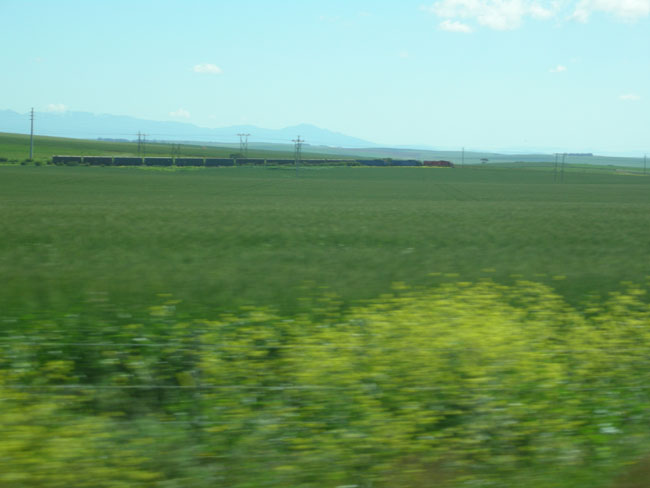 |
But you do have to go over dirt roads to get to many places.
This is the road running east from Bredasdorp to De Hoop Nature Reserve. Some stretches were very smooth, some were a little rougher. Evidently the maintenance of the road fell into the laps of the farmers whose properties it went through.
|
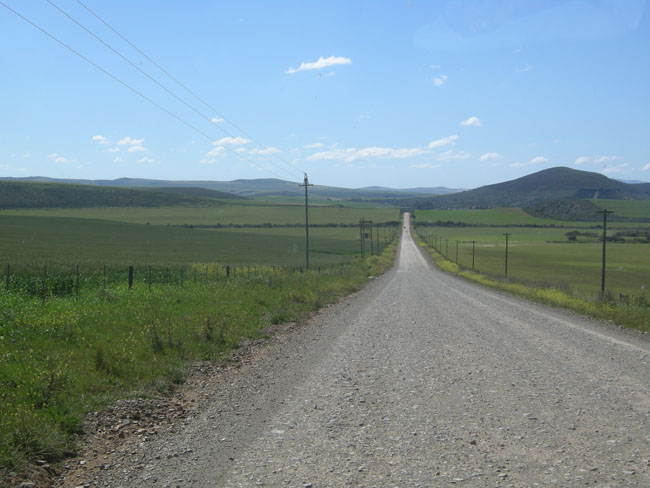 |
De Hoop reserve features a large wetlands area that has thousands of wawterfowl passing through, plus extensive mountain bike trails. Since we were just driving through, the paths available to us were more limited. But it was still richly rewarding, presenting large expanses of fynbos species such as varieties of sugarbus and pincusion proteas.
On our relatively short drive to the sea, we saw a number of common (for South Africa) and a couple of rare animals.
We found these antelope grazing among the flowers |
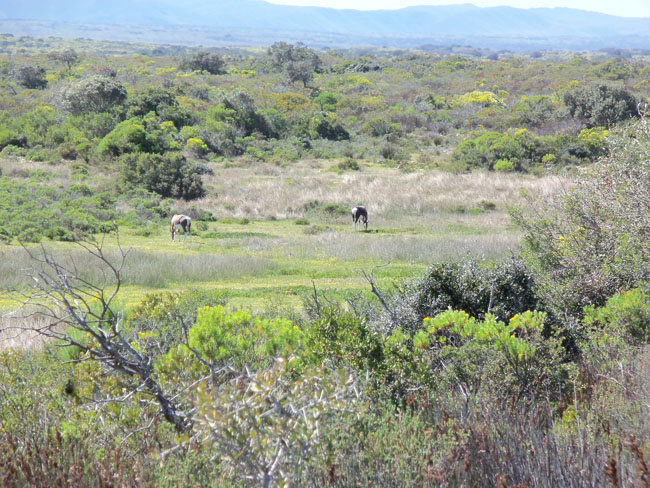 |
| As well as Zebras |
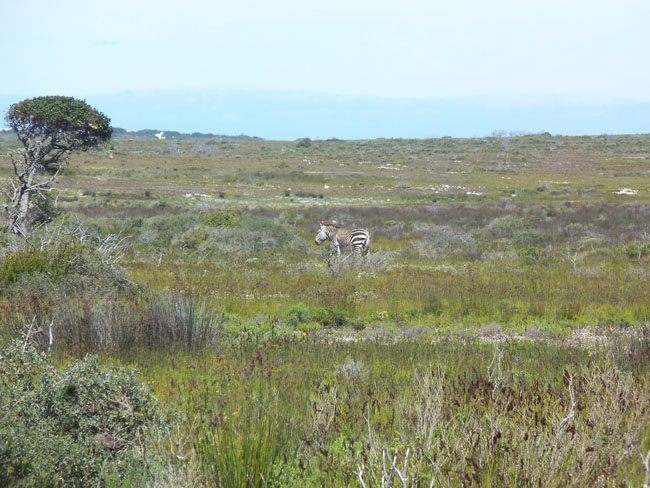 |
At a parking lot at the end of the road, the birds posed for us (but weren't wearing identification tags)
A note on guidebooks: we found many bird books whose primary title included the letters LBJ ... Little Brown Jobs. Our books tended to concentrate on 4-legged animals, and only had about 30 to 90 or so bird species identified (per book). This particular example didn't make that cut. |
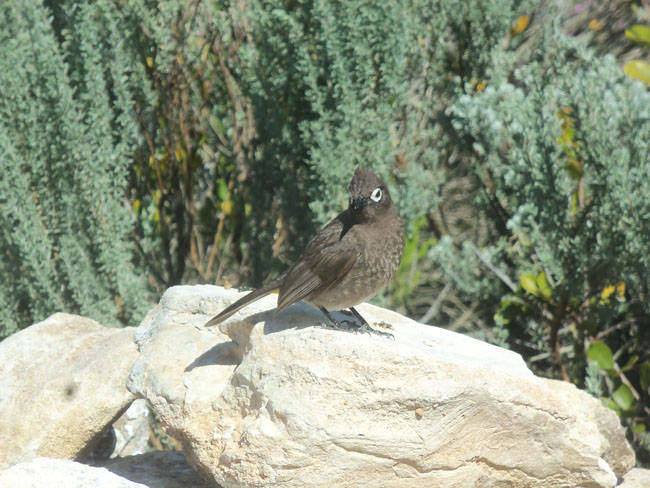 |
| ...nor did this one. |
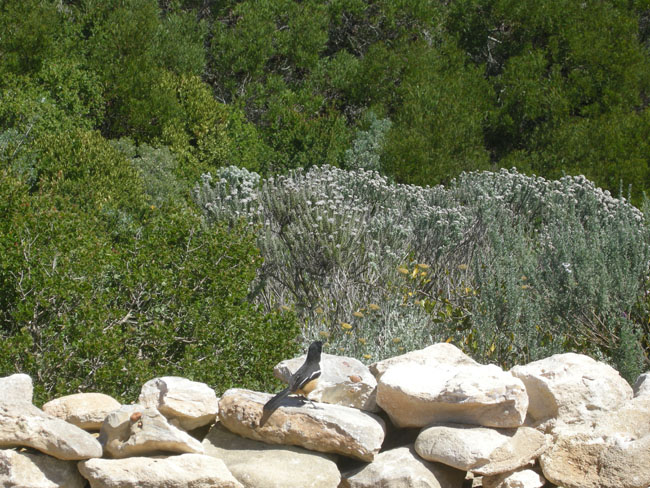 |
| The dunes were dramatic |
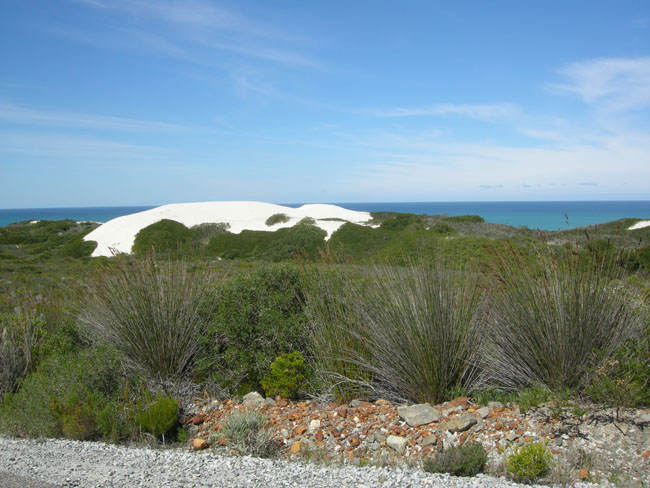 |
| At the end of the road was the sea... |
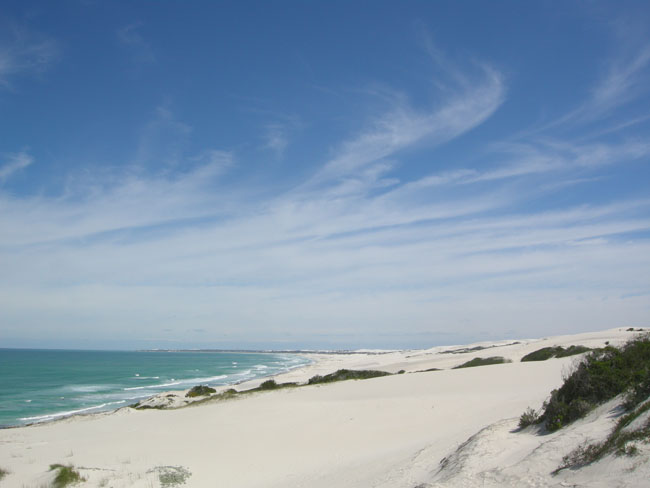 |
| And, standing at the top of the high dune, we began to see Southern Right whales... and their calves. |
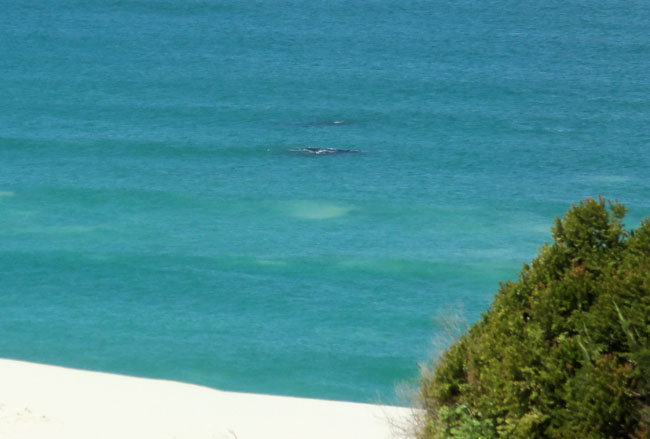 |
| Many people come to De Hoop just for the whales... |
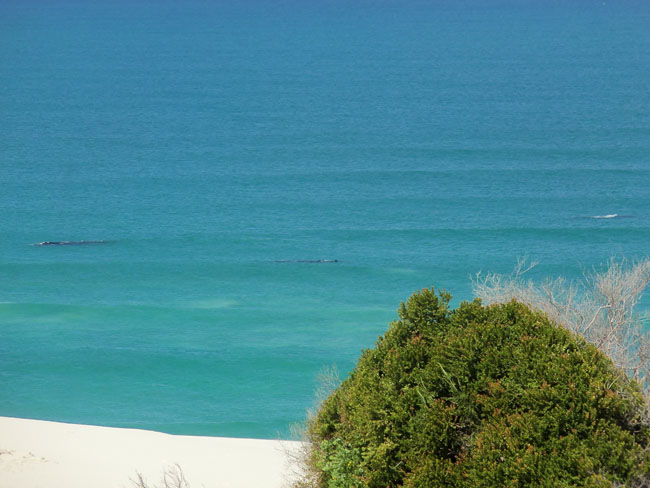 |
| ... for good reason. All told, we saw over twenty from this one spot. |
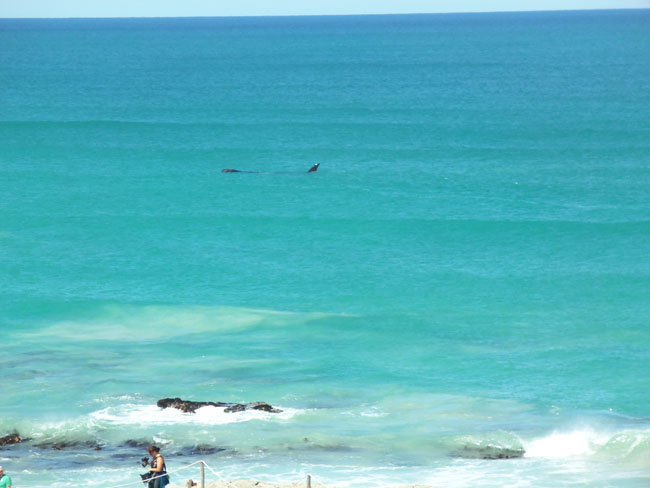 |
| Karen loved the flowers |
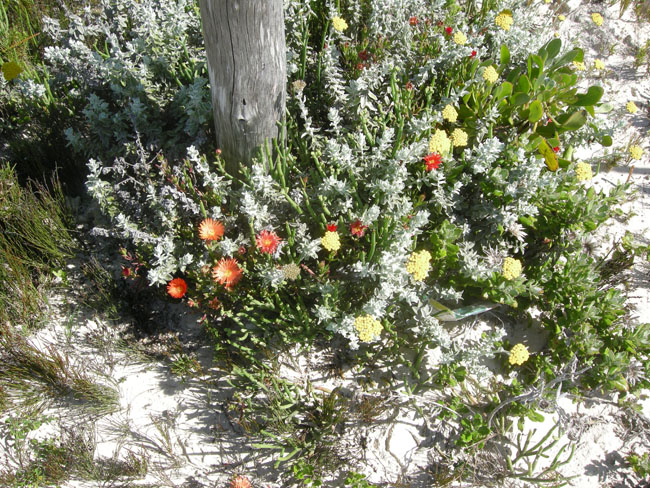 |
| |
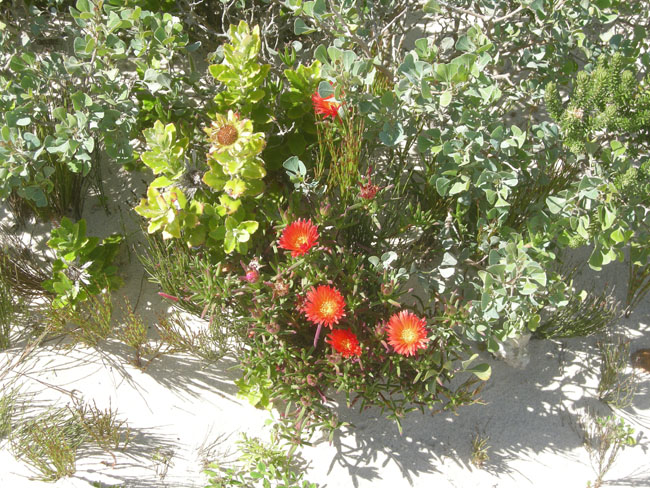 |
And the rocks.
As we left the shore, a fairly rare-to-see Caracal, one of South Africa's lynx-like cats, crossed the road in front of us. Too quick to be photographed, but memorable. |
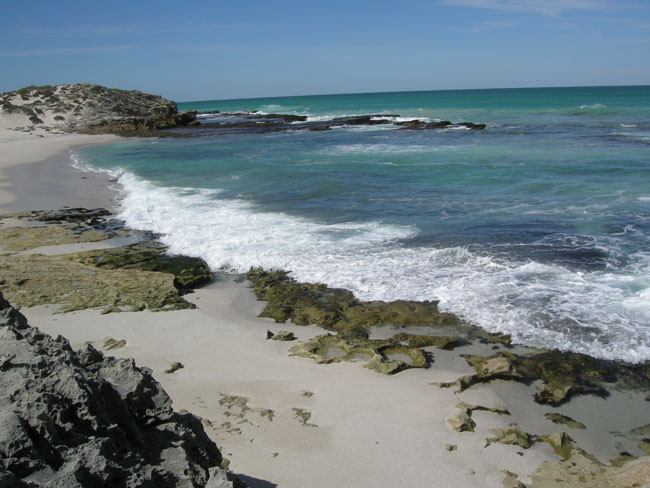 |
This was our first reserve where animals were one of the primary focuses. The non-zebra pictured is a bontebok. At this point we felt privileged to spot such a rare animal, which had been hunted to near-extinction in the 1930's.
This park was the first that finally made Karen feel that she was seeing the Africa of legend. |
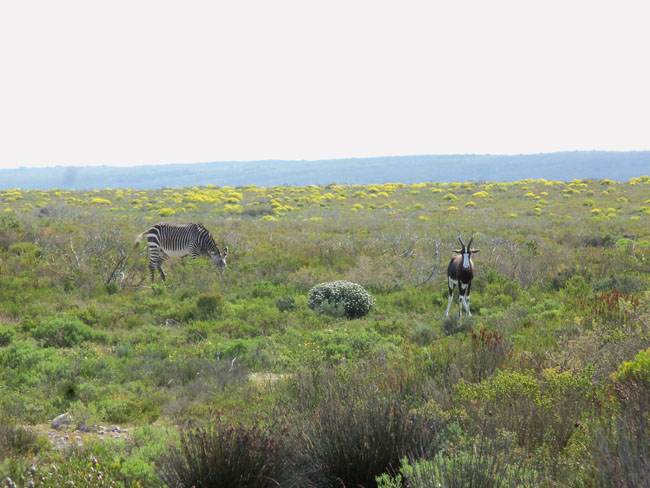 |
| They also had ostriches and a rounded, green terrain. Very different from the dry hills of the west. |
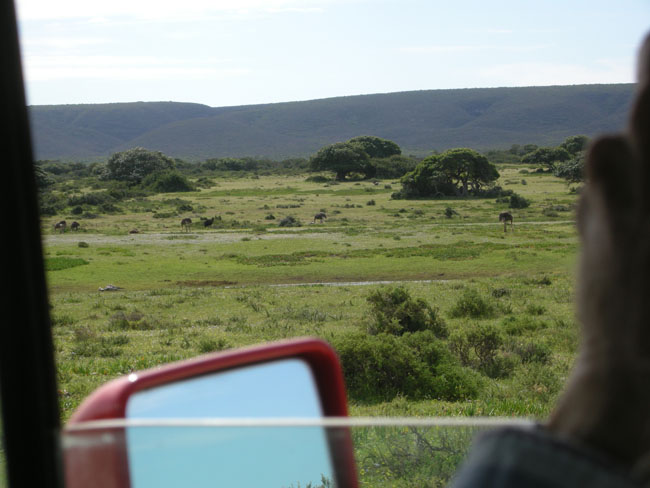 |
| Campgrounds warned us of baboon problems but we saw very few. |
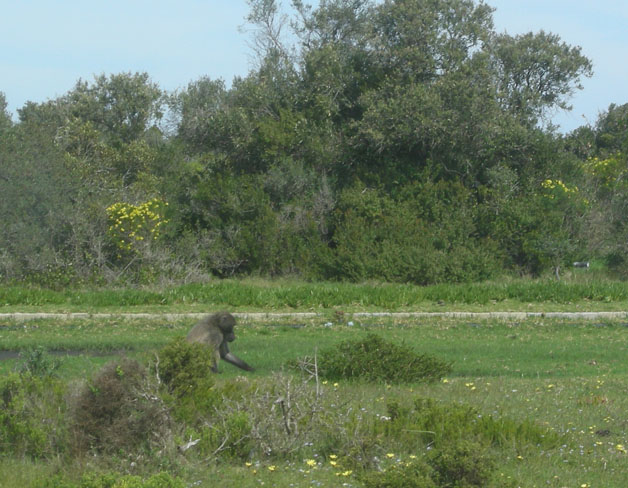 |
| Here we mostly saw bontebok |
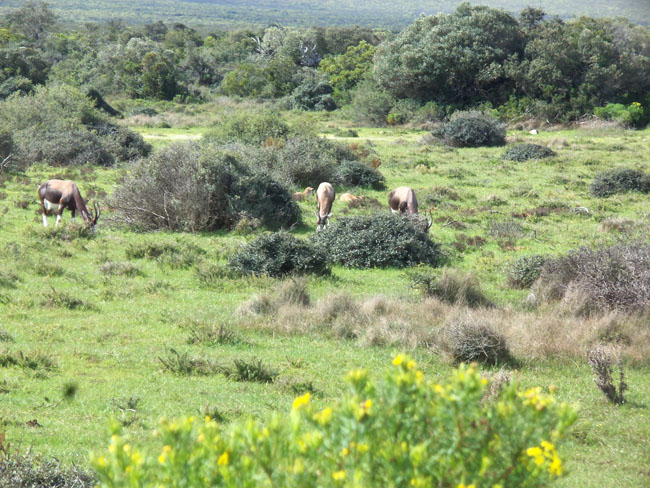 |
| and more ostriches |
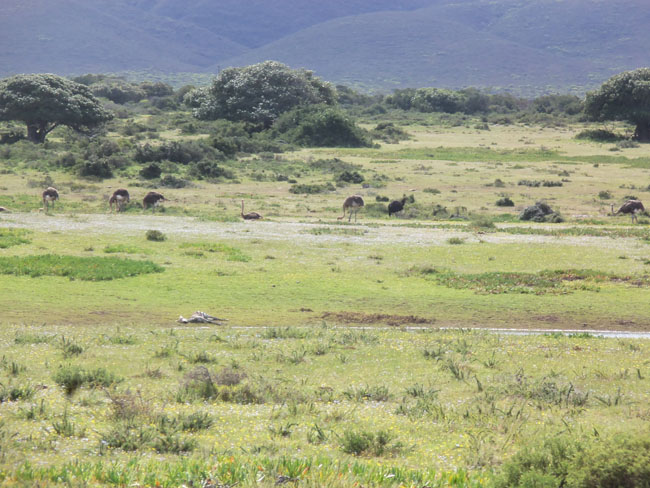 |
| and more bontebok |
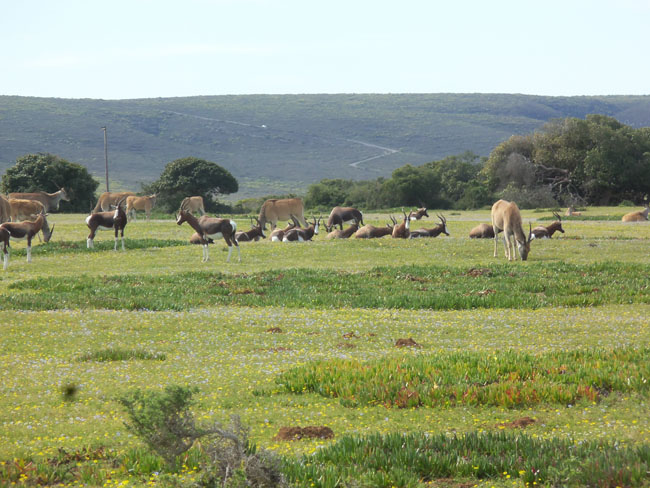 |
| A marvelous truck in the parking lot where we stopped for lunch |
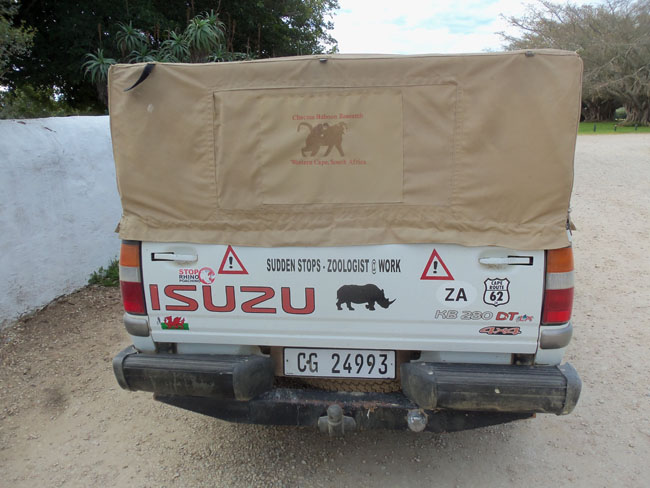 |
| With proteas on the table, good food, an attentive staff and the view below, this lunch stop most closely matched the pampered guest feeling of any spot on the trip. |
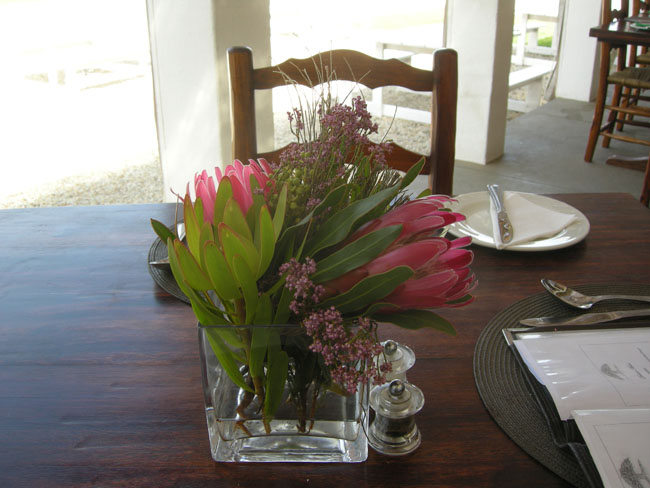 |
| Our lunch table view |
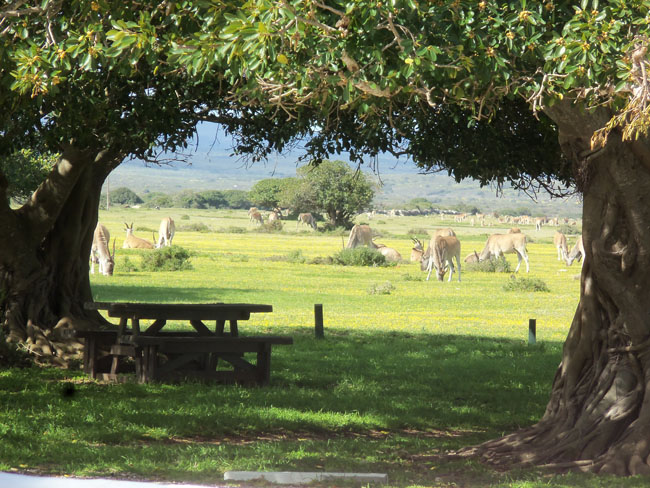 |
| with guinea hens |
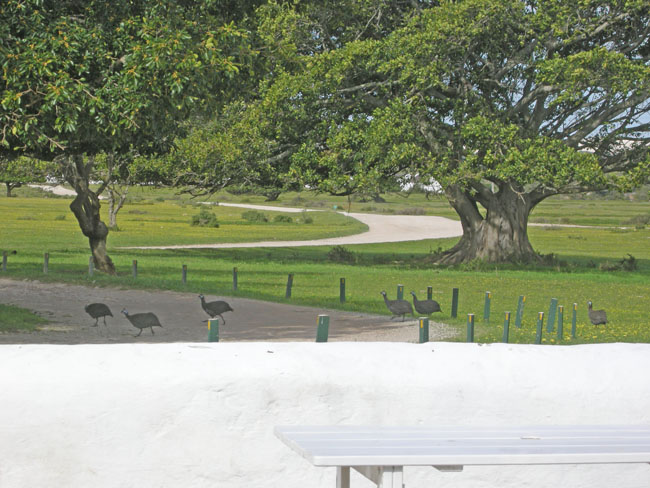 |
| And more bontebok on the drive out. |
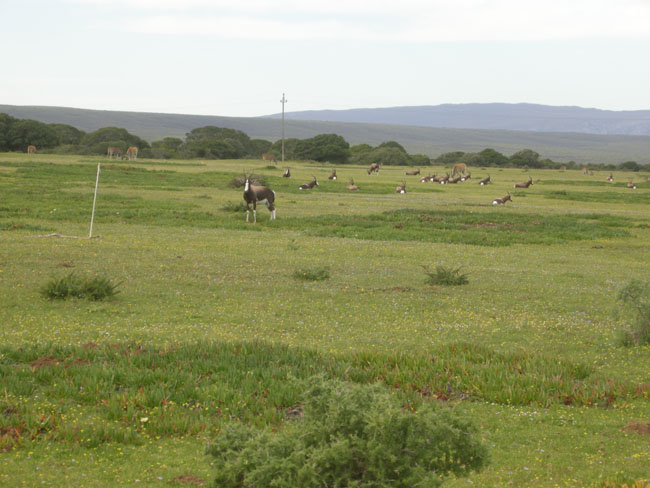 |
| along with eland. The sharp-eyed amongst you will have spotted more of these in the picture immediately before the pick-up truck. |
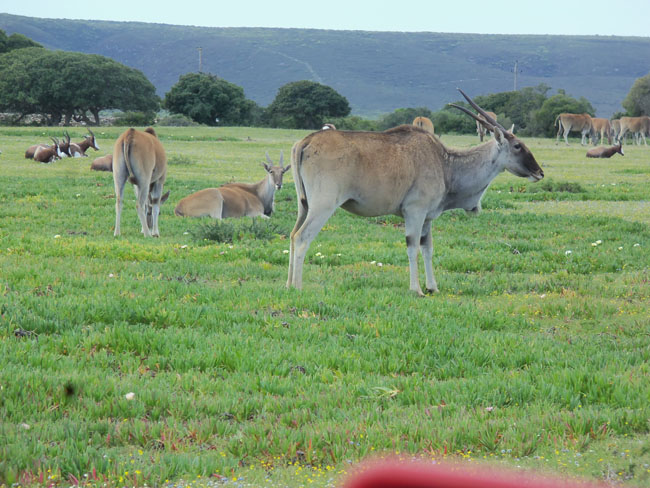 |
| and ostriches |
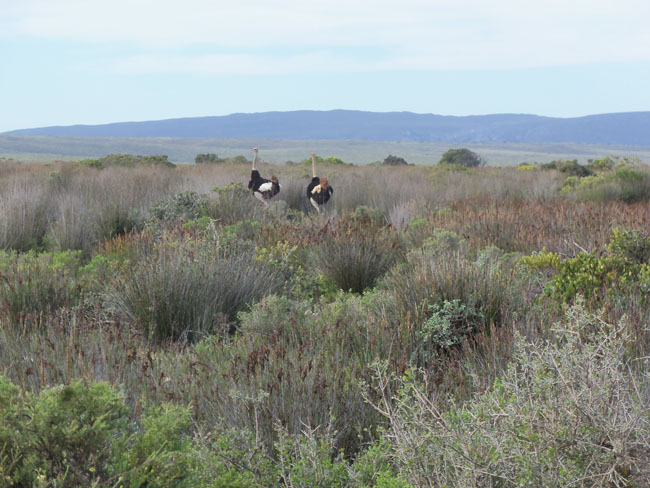 |
| We drove north from De Hoop to the much smaller Bontebok National Park, where we would spend the night. |
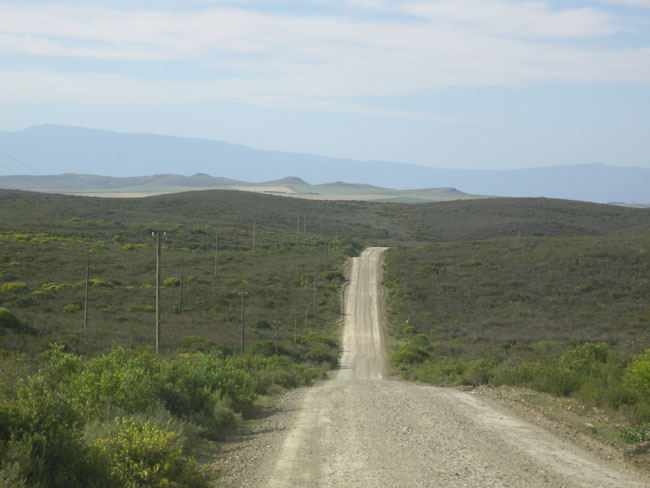 |
| ... back throgh farmland |
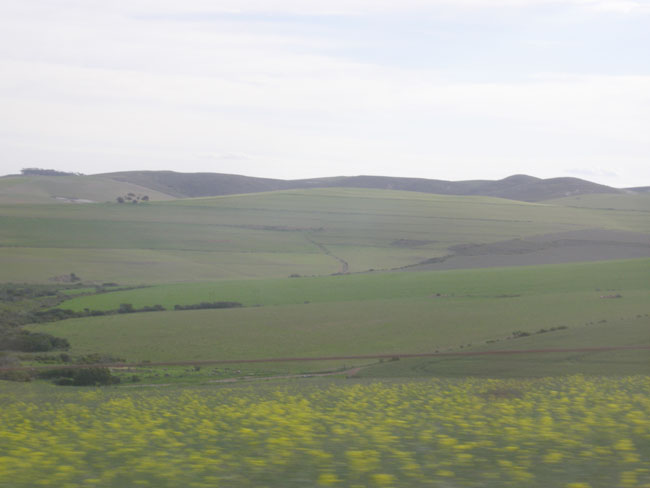 |
| But even in the farmland there were wonderful things to see. Around 70 of these rare blue cranes were standing, looking into the wind. |
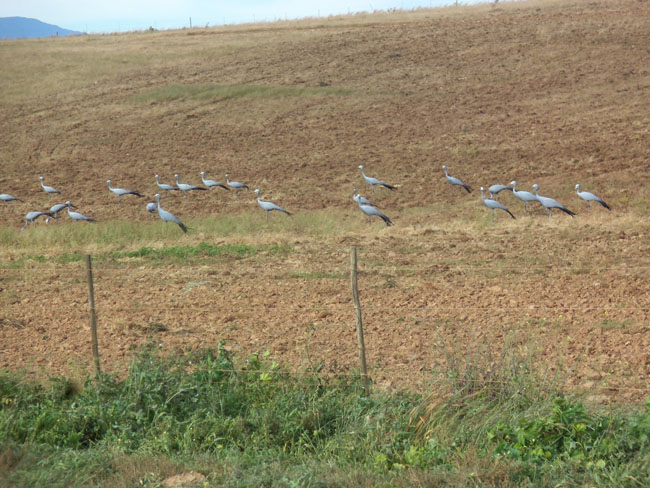 |
| Reaching the main road at the city of Swellendam, we took the exit for Bontebok National Park. We saw something colorful at a distance which turned into this sprawl of a landfill |
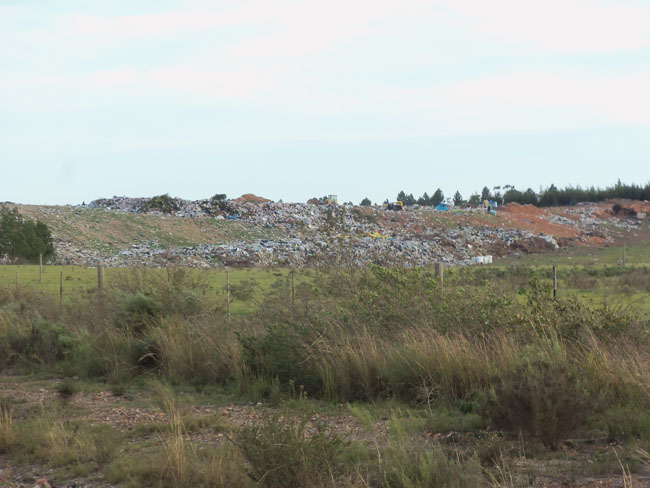 |
| Looking up we saw a stack of lenticulars |
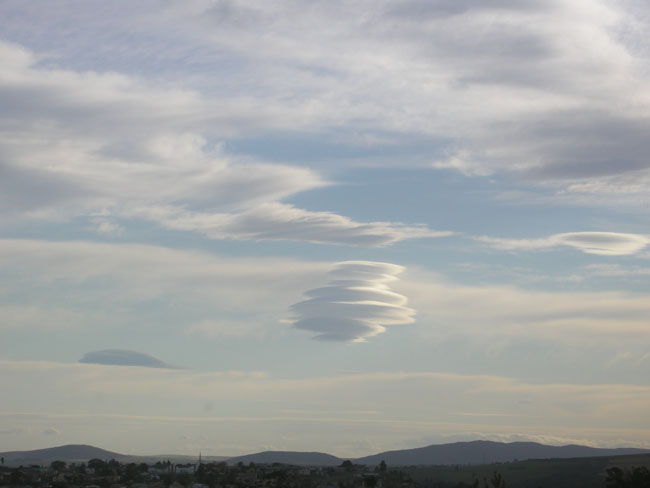 |
| The fun clouds made for a spectacular sunset. |
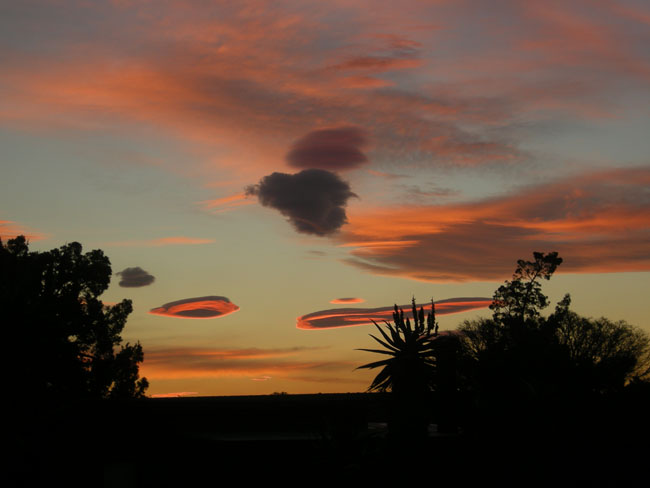 |
| In keeping with the ranch-turned-to-park tradition, Bontebok's campground was named Lang Elsie Kraal (corral). The campground had, you guessed it, its own bontebok. |
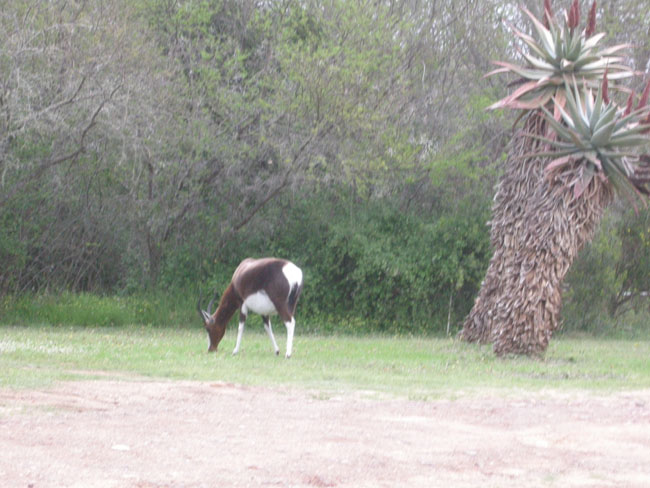 |
| Our three weeks of spectacularly fine weather finally ran out. The next day was showery (but not pouring). Most of the animals bedded down except these park-signature bontebok. |
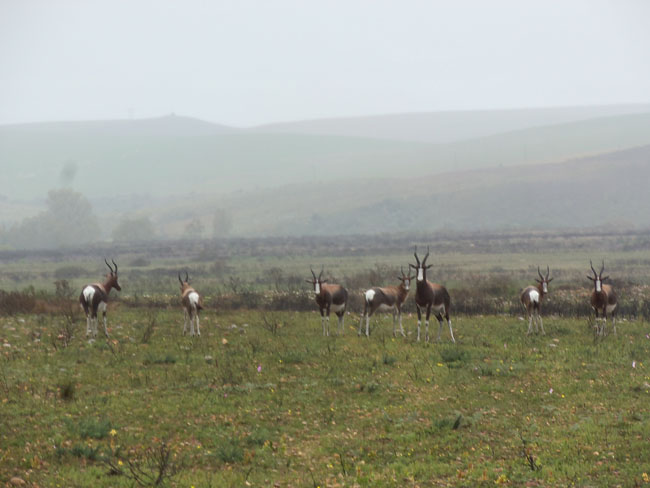 |
| But we still enjoyed acres of flowers |
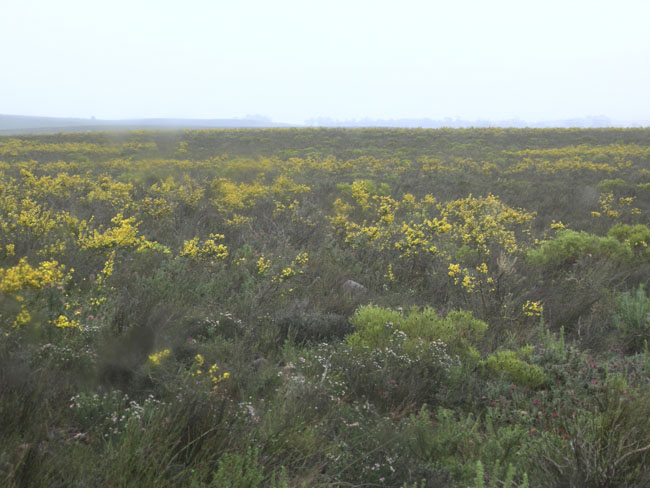 |
| ... even if they weren't exuberantly opening to catch sunlight. |
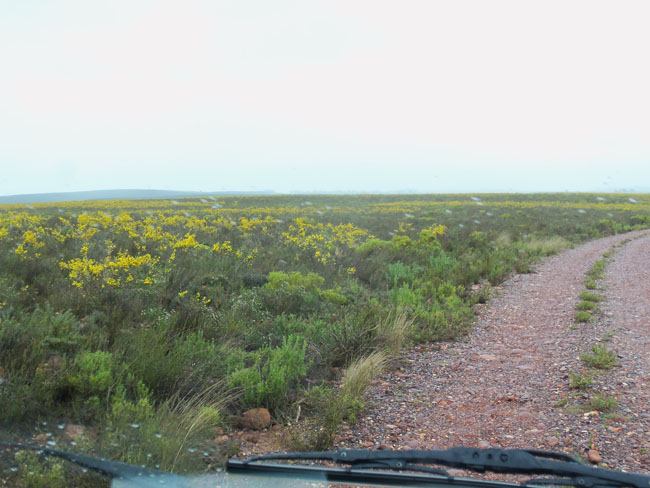 |
| Including proteas |
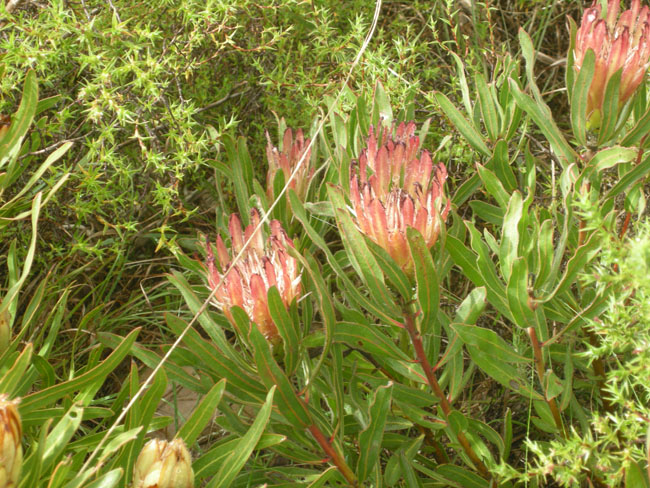 |
and more proteas (these are called cone flowers). I wonder why they have evolved such yellow leaves.
As you can tell from just these two photos, "protea" covers a wide span of flower sizes, colors and apparent shapes. |
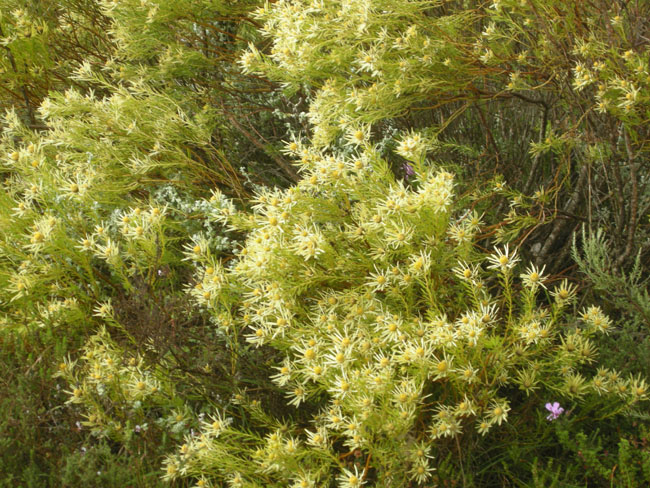 |
Weaver bird nests and fruiting aloes.
As we departed the campground, the tree near our site exploded with activity as the birds tended to their nests by hanging from the basket's bottom as they improved the weaving. The yellow bird can be seen under the leftmost nest. |
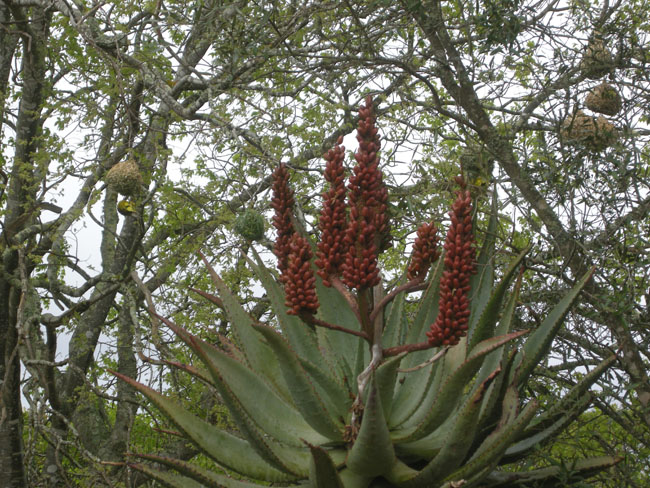 |
| Moist low clouds skirted the southern flanks of the Langeberg mountains as we explored the rest of this fairly small park. |
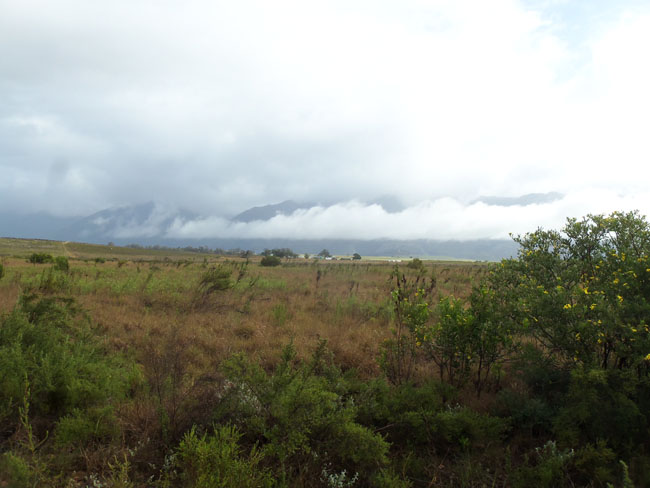 |
| a few more bontebok |
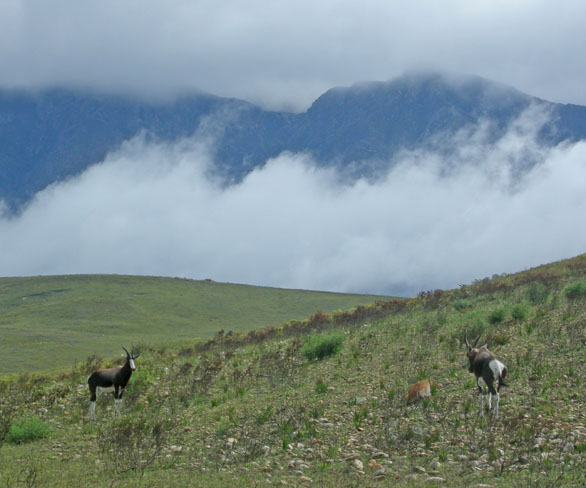 |
| and red hartebeest (with termite mounds in the background) |
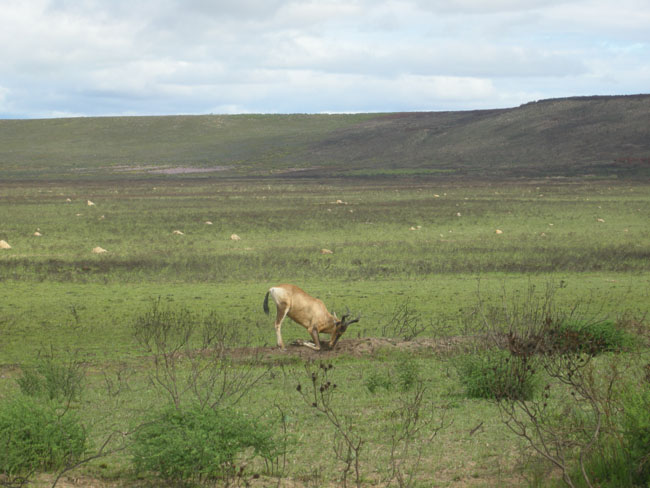 |
| thorn trees silver amidst the green |
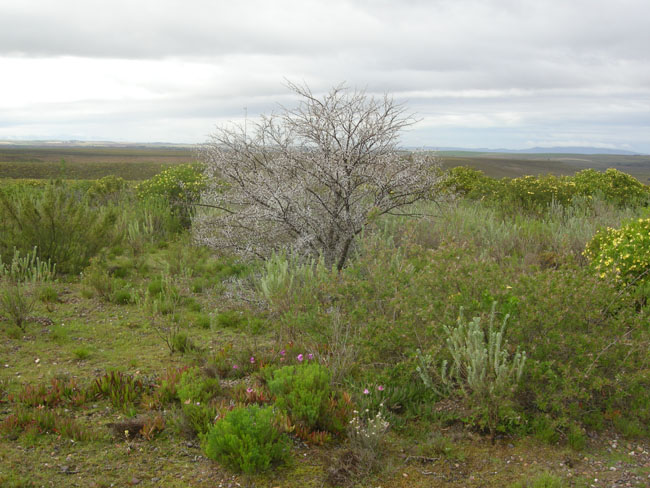 |
| more red hartebeest |
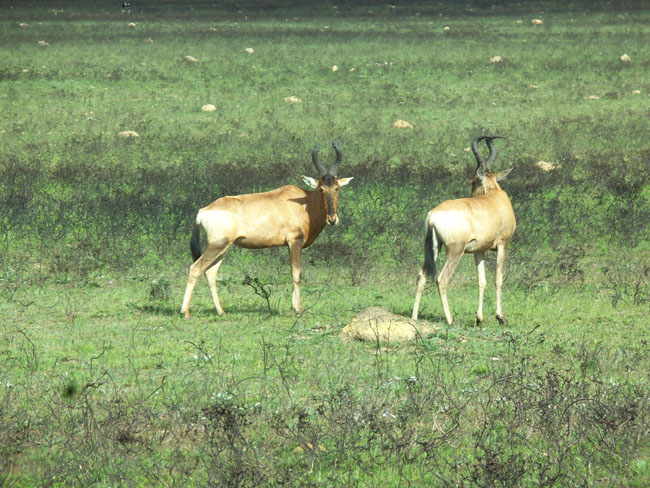 |
| another bontebok, going for photogenic. |
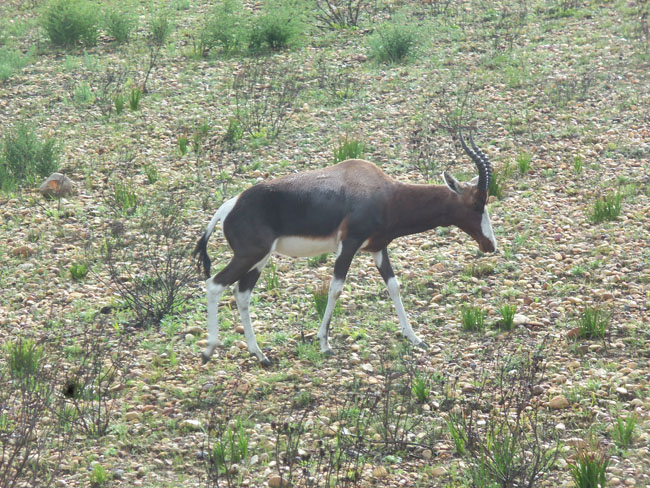 |
| The park's roads were local red gravel, except this steep embedded block section to keep things from washing out and getting torn up by 4-wheel drives. |
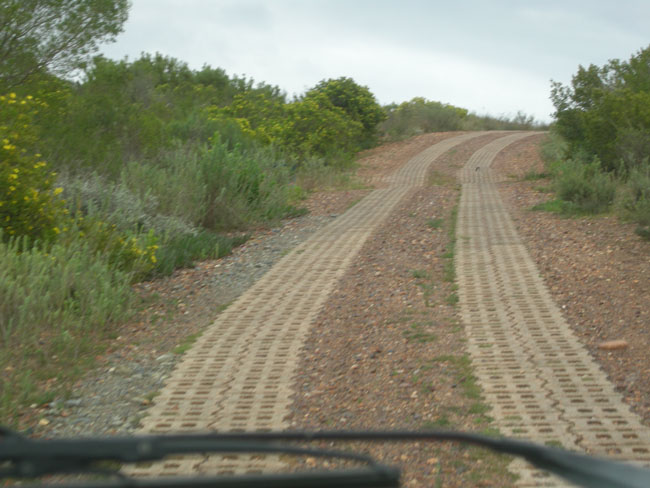 |
| A hawk amidst the flowers |
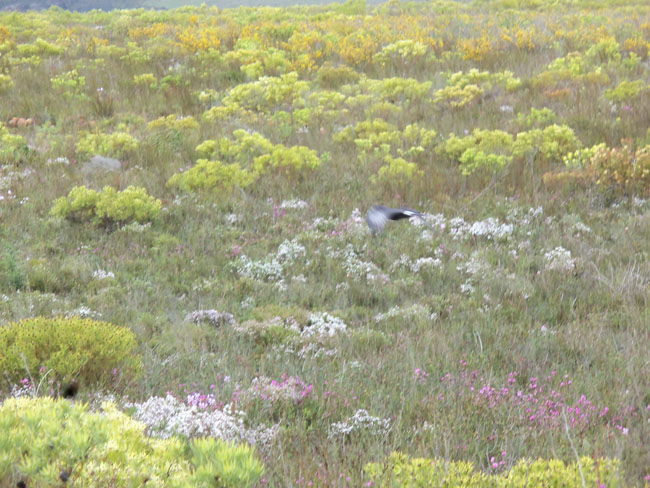 |
| And a final weird red flower. |
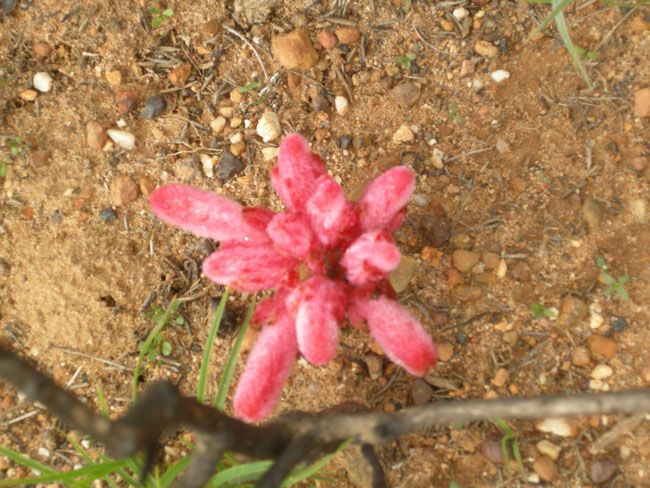 |
Heading east on the N2, we stopped through Heidelburg for Dick's "real" morning coffee. We caught a glimpse of their impressive Dutch Reformed Church.
Karen fell asleep a few minutes later (lack of coffee, obviously) and missed seeing huge herds of ostriches pastured as commercial livestock. |
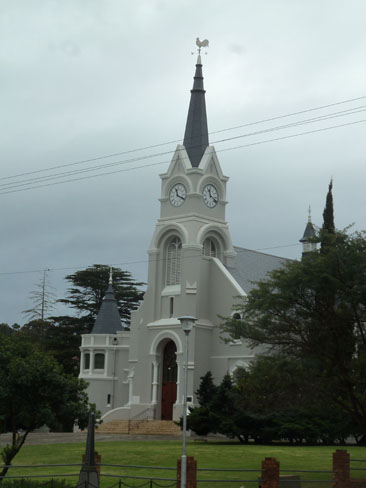 |
| And then it was on to the sea again in Mossel Bay. We paused for more attempts to capture waves on "film". |
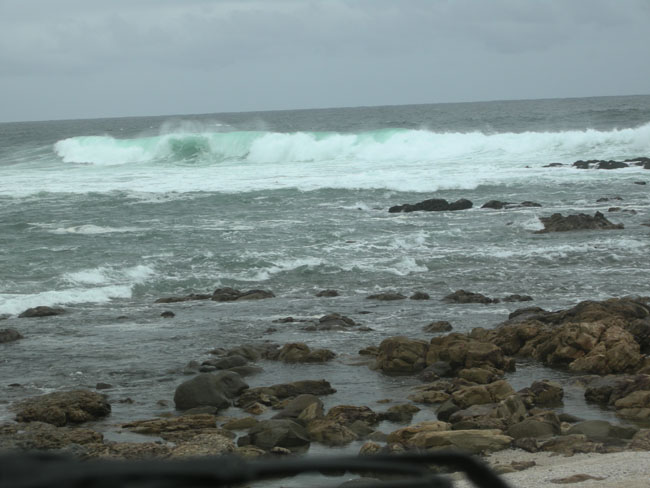 |
| and to gawk at the large White-breasted Cormorants. |
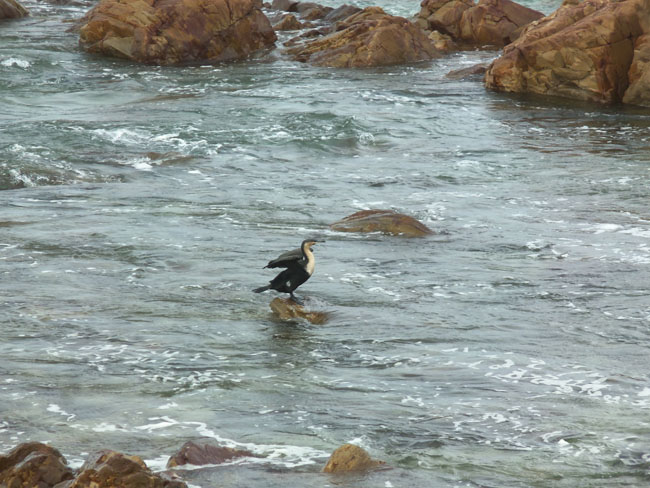 |
| Karen decided that the strong wind made walking along the clifftops too unsteady. |
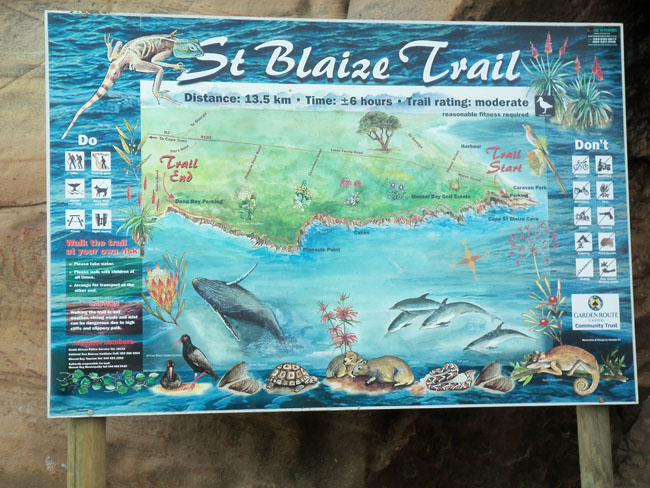 |
| but we did surprise dassies in the parking lot |
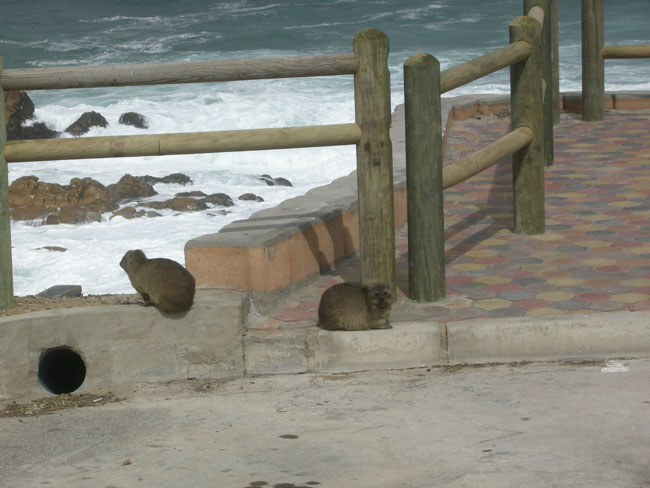 |
| and climb up to the cave where much important archaeological research had been done, with evidence of habitation dating back 200,000 years. |
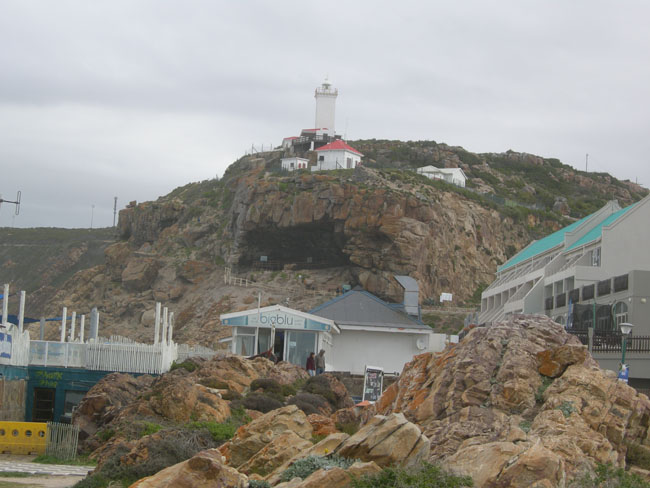 |
| The view from the cave's mouth was quite fine. |
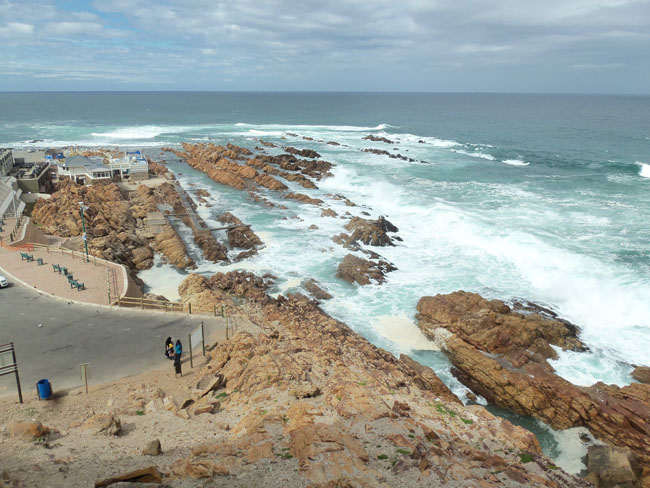 |
| There were many "do not feed the dassies" signs but I don't think they read them. |
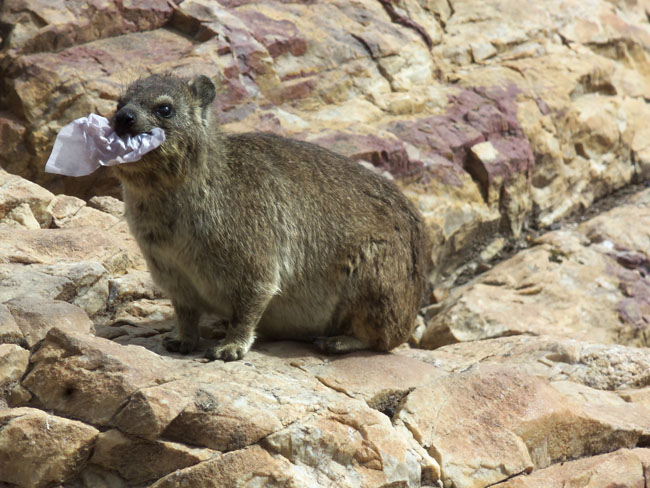 |
| And the signs didn't say anything about the local equivalent of jays. |
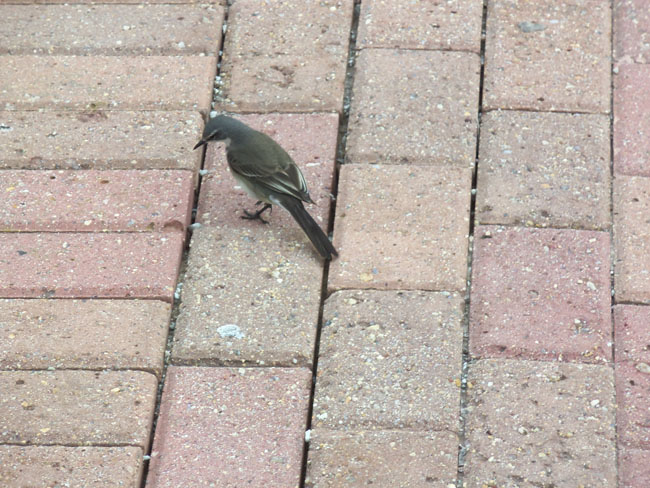 |
| over the next headland, another fine but cold beach. |
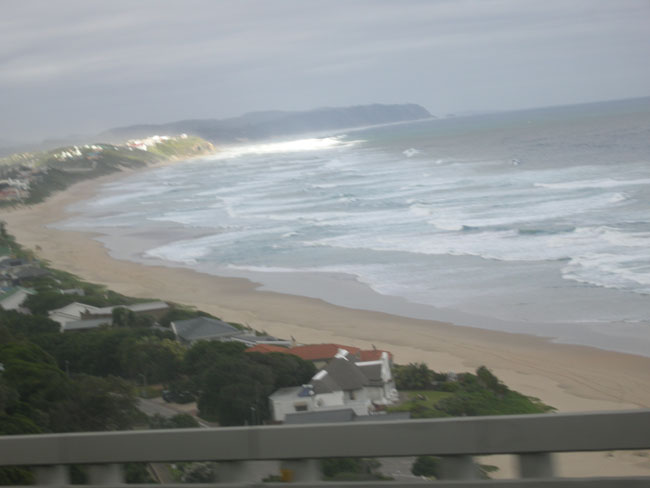 |
| A small town's park with guinea hens. Karen admits to taking about 100 photos of guinea hens, trying to capture exactly the correct pose. |
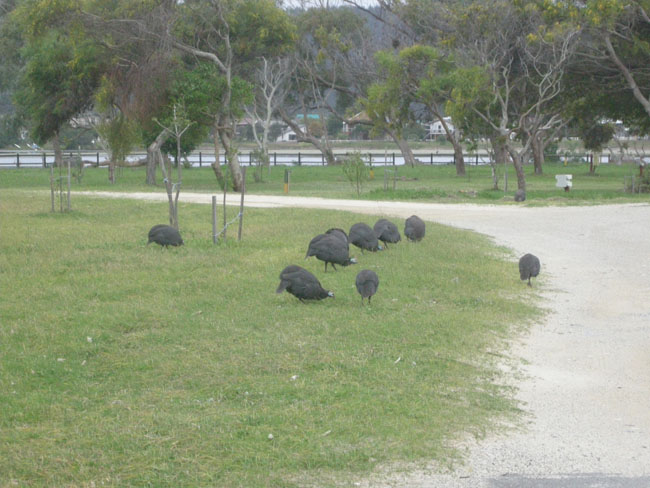 |
| and Egyptian geese |
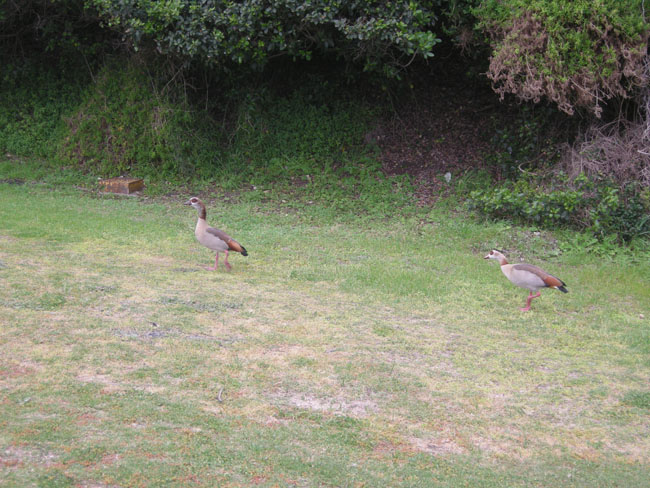 |
but the gulls rule the shore
|
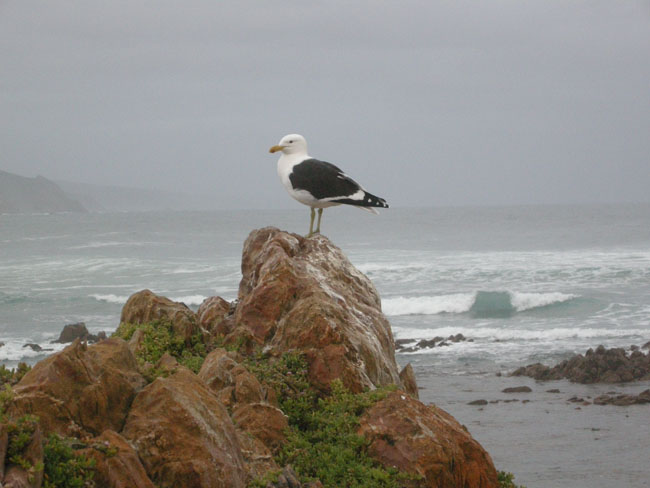 |
| This is Buffles Bai, one of our favorite campgrounds. |
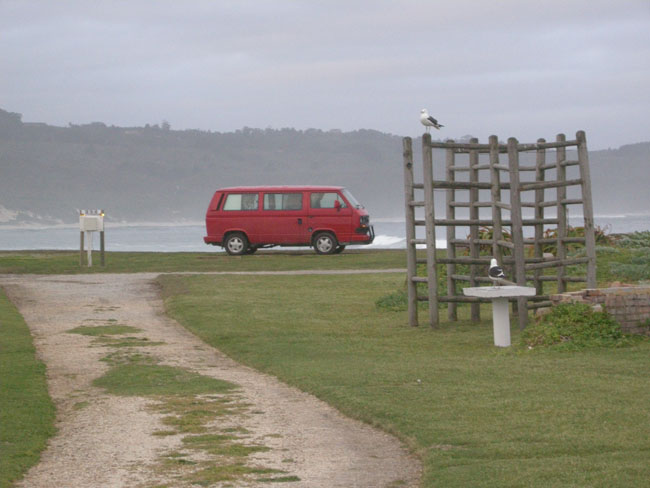 |
| The wind whipped up that night...
| 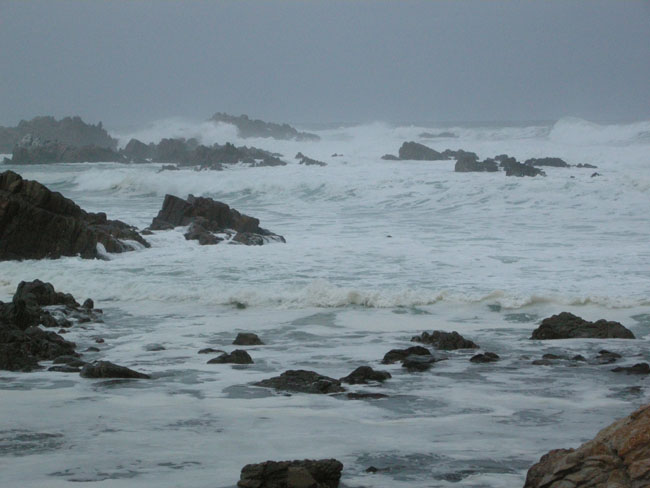 |
| so the gulls were walking instead of flying.. |
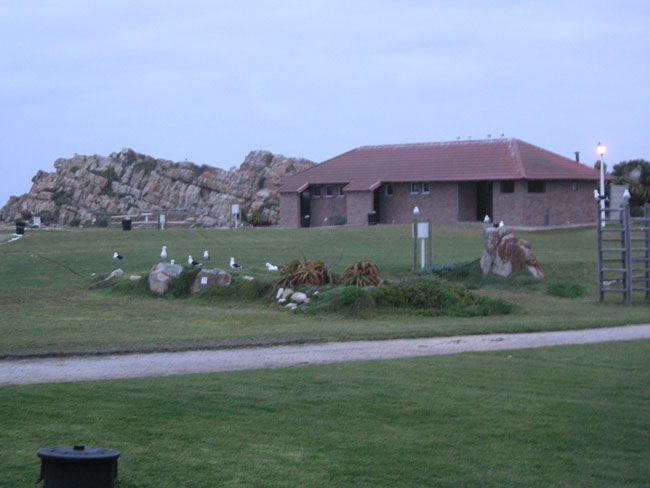 |
| In the morning the wind was calm but there were still waves to photograph. A couple of wet-suited surfers were paddling out across the bay (not in this photo). |
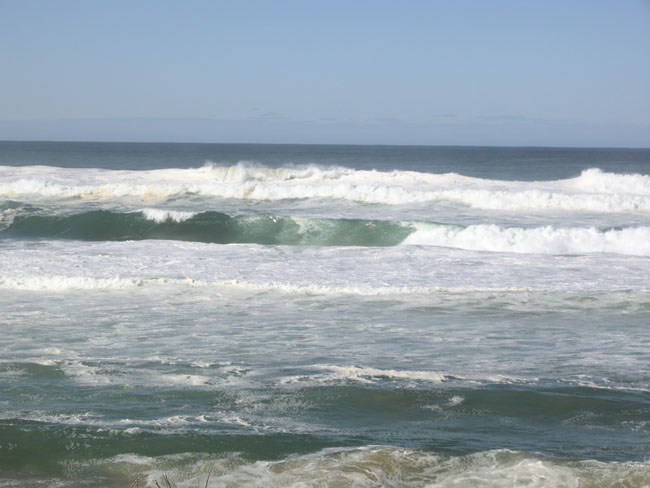 |
| At the nearby city of Kynsna, the central shopping mall had an elephant made from drift wood. |
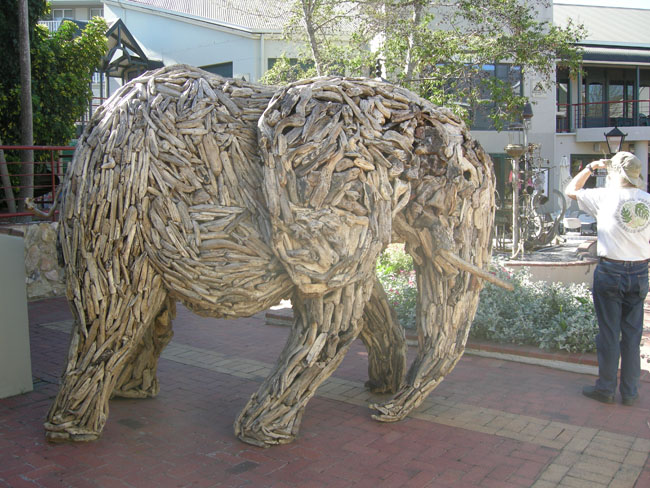 |
| Dispensers frequently found (empty) in Men's restrooms (Karen doesn't recall seeing any in the Ladies'). |
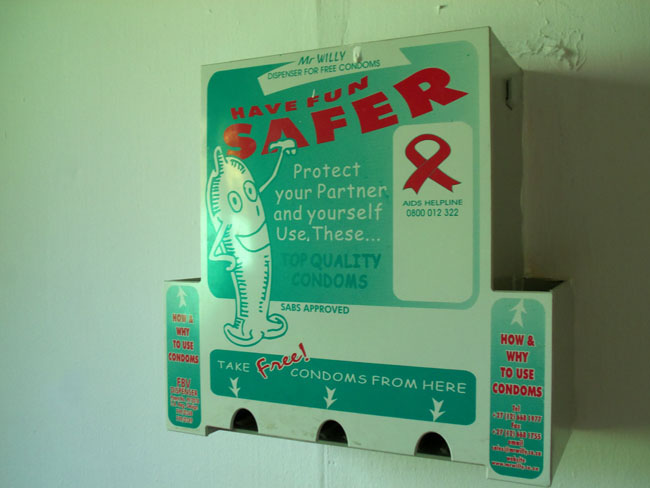 |
| Kynsna was a sprawling vacation spot on the north shore of the broad mouth of the Kynsa River. We drove out to, and up and up, the headland at the outlet of the river and looked back. |
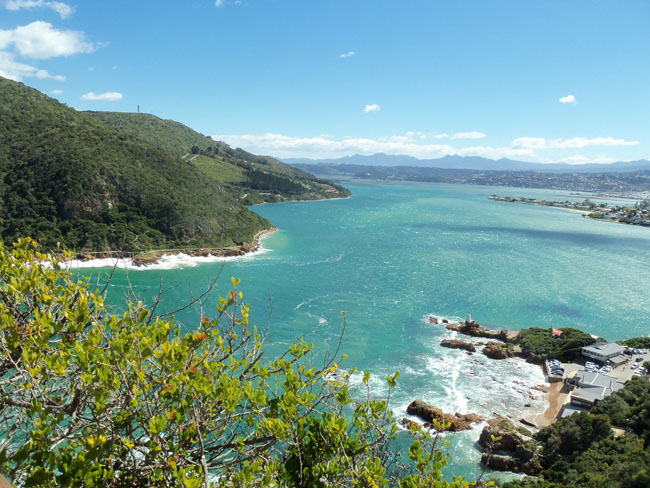 |
| ...then out and down to the sea... |
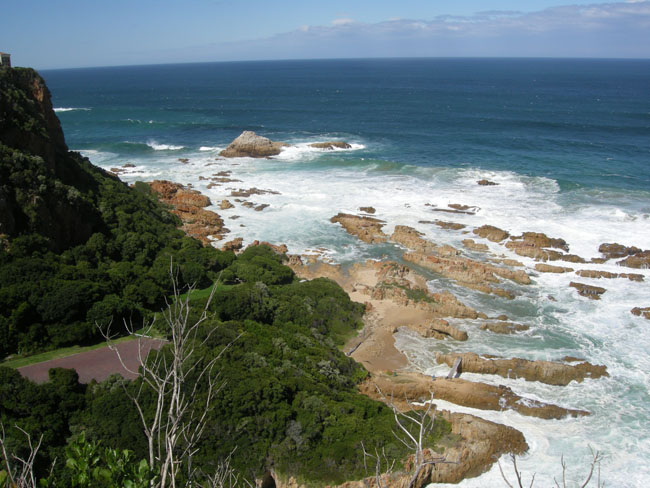 |
| ...from the cliffside walkway. |
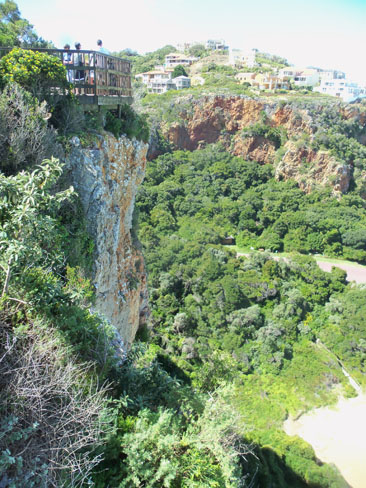 |
| Lazy waves rolling towards us. |
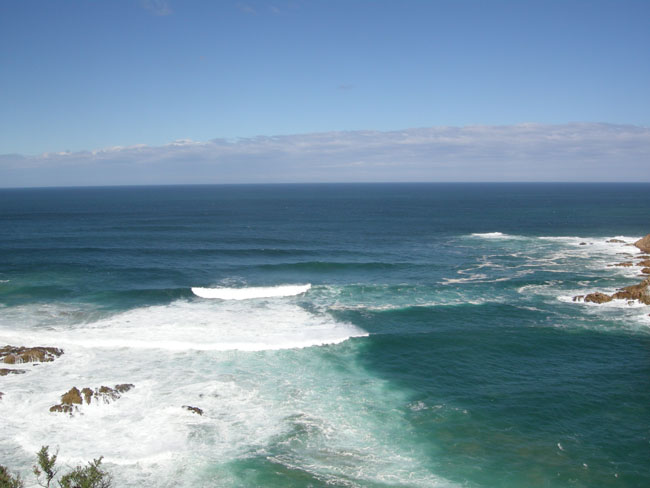 |
| But the sea caves on the other side of the outlet show that the water here can carve rock. |
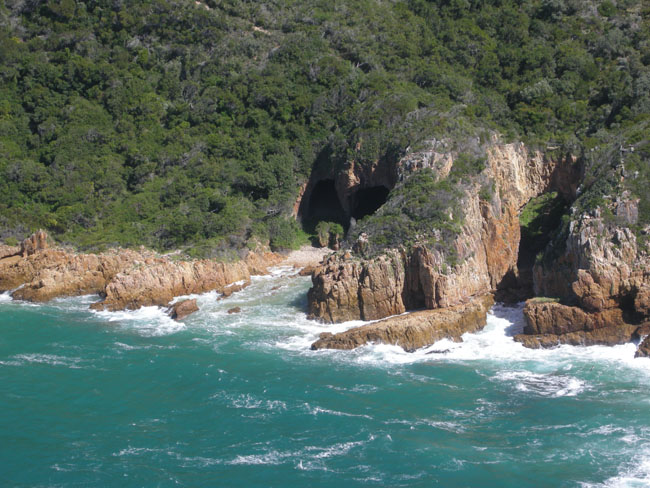 |
| We're finally in a part of the country with trees. From Kynsna we drove inland on gravel roads to the back country with some nature reserves. This is an exceptionally tall Yellowwood. |
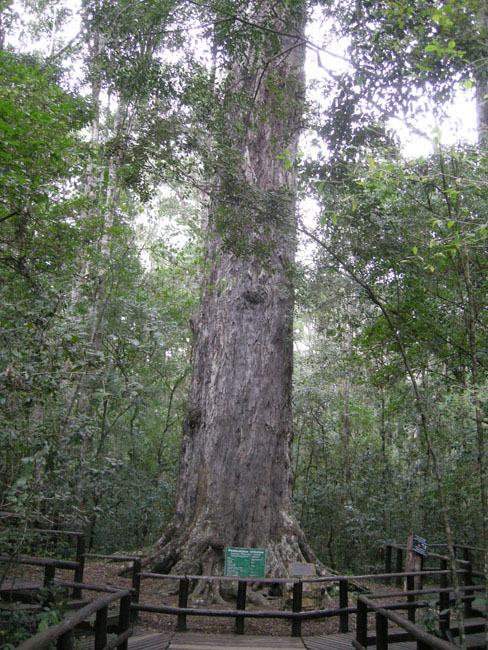 |
| Its genus is Podocarpus, a primative conifer often sold as a house plant. |
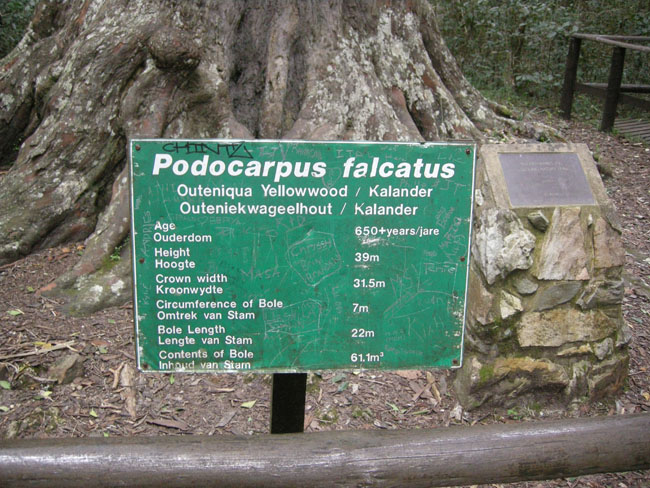 |
| A pair of ibis exploring a hill near the reserve's offices. |
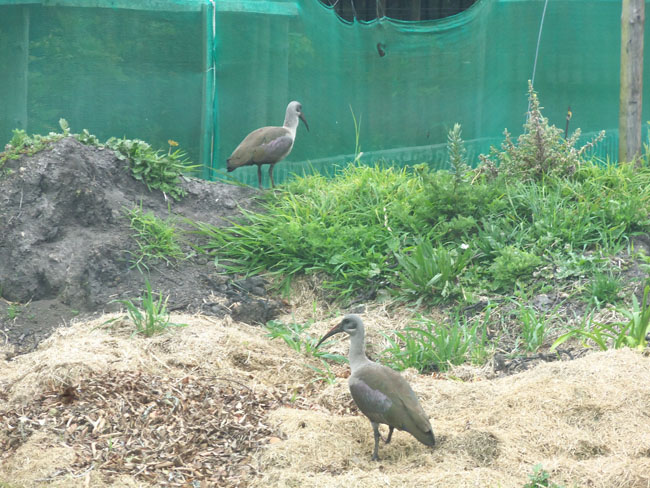 |
| Beyond the protea beside the road it's a long way down to the valley. |
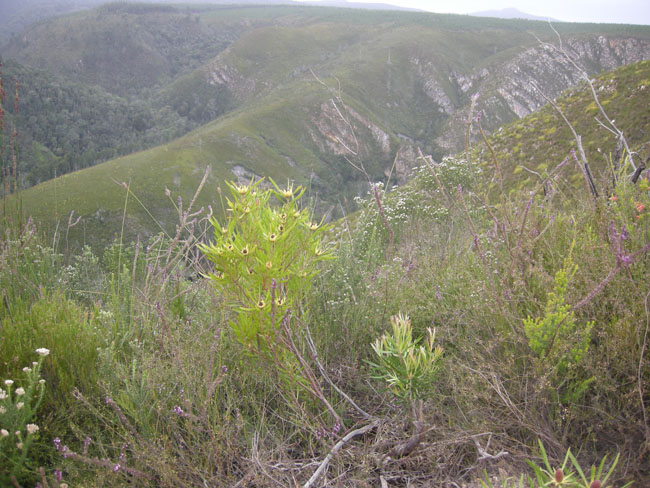 |
| Lots of ferns and dense growth, very different from our previous (and most of the future) biomes. |
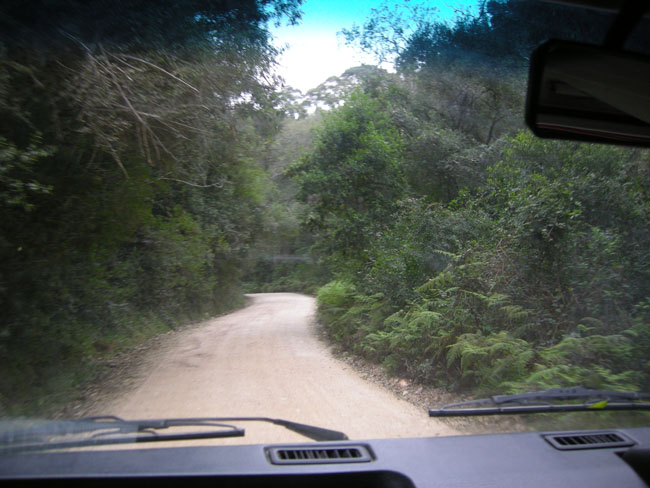 |
| As we left the protection of the reserve and the dirt road turned to paved, we met this themed, gated, housing development. |
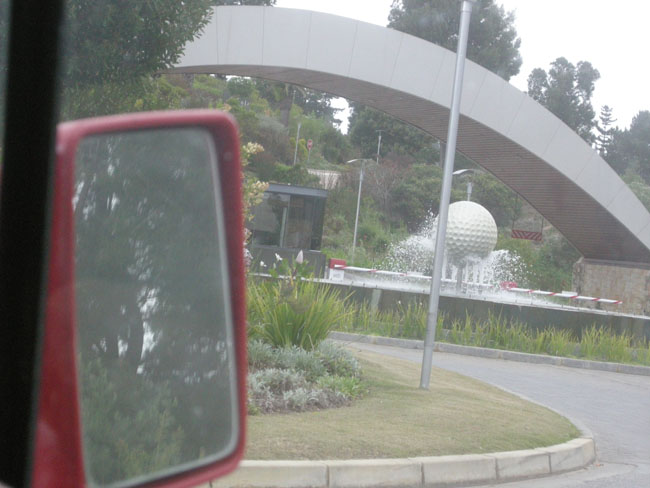 |
| A rarity for us, we back-tracked to rejoin the gulls at Buffles Bai for another windy night. |
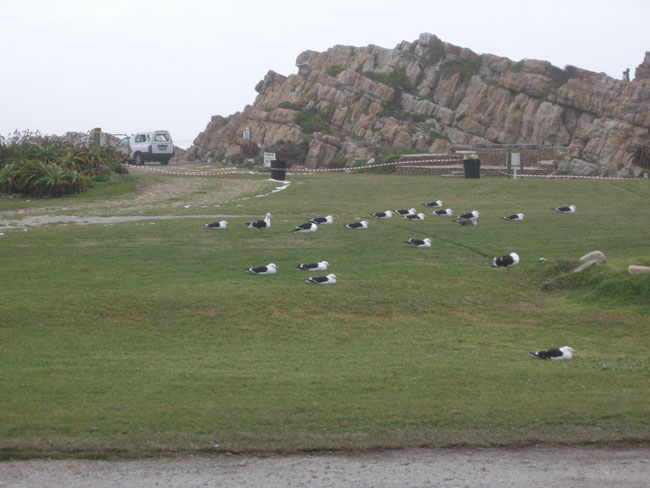 |
| In the morning a seal was circling with its fin out of the water. |
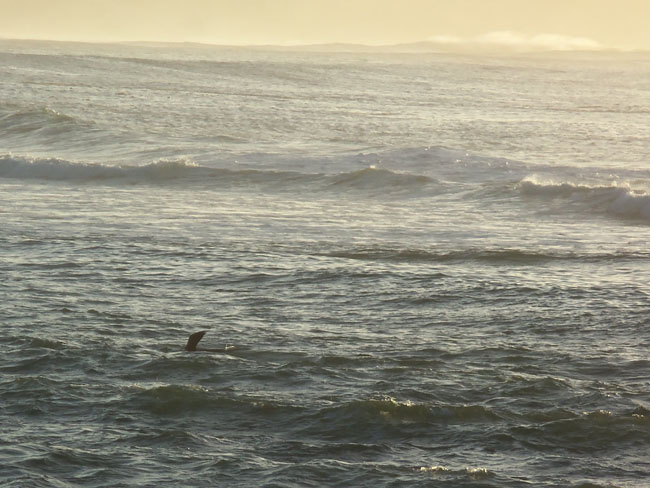 |
| Out on the road again we passed an industrious rebuilding of a township area |
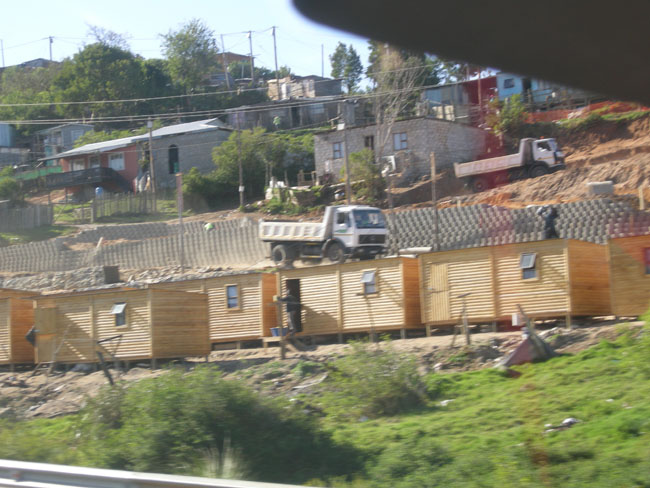 |
| Further down the road, a suspiciously tall tree (note cell antennas) |
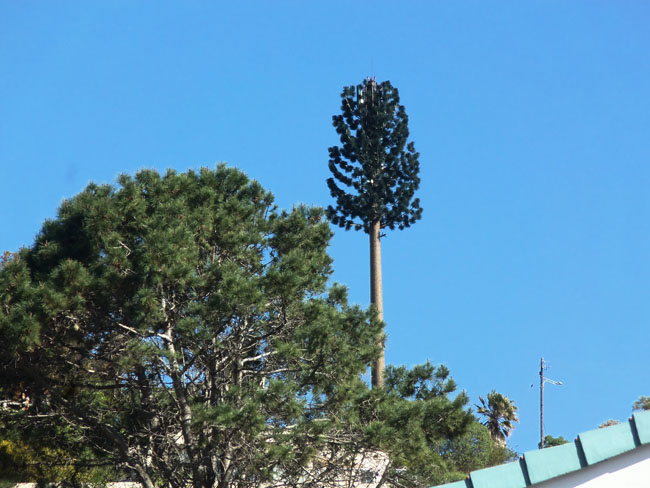 |
| Near Plettenberg the Robberg Nature Reserve is a rocky penninsula with lots of walking trails. |
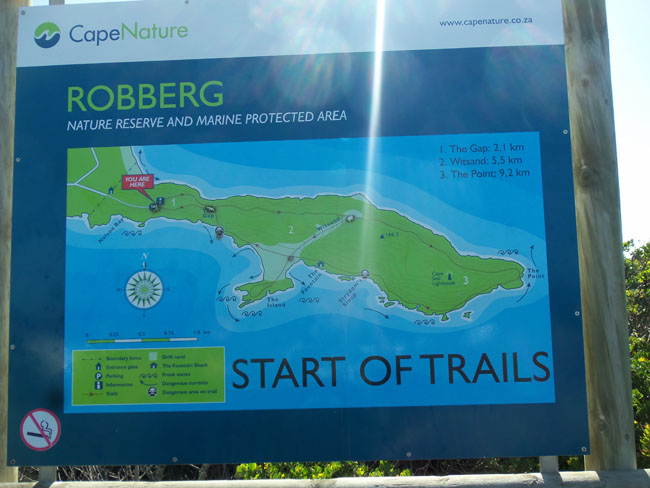 |
| Very scenic |
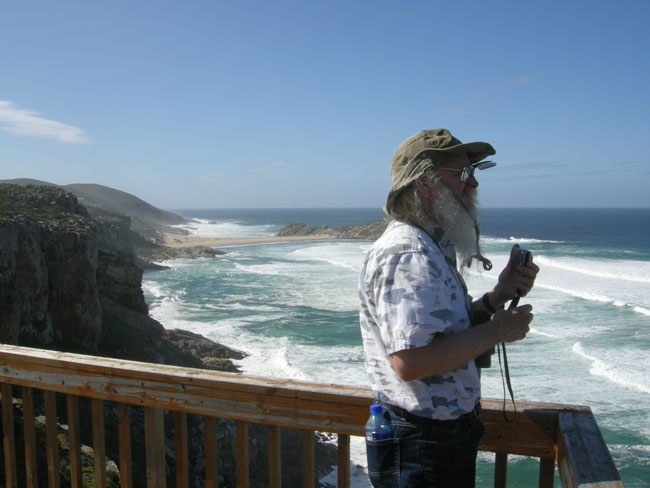 |
| with interesting bugs |
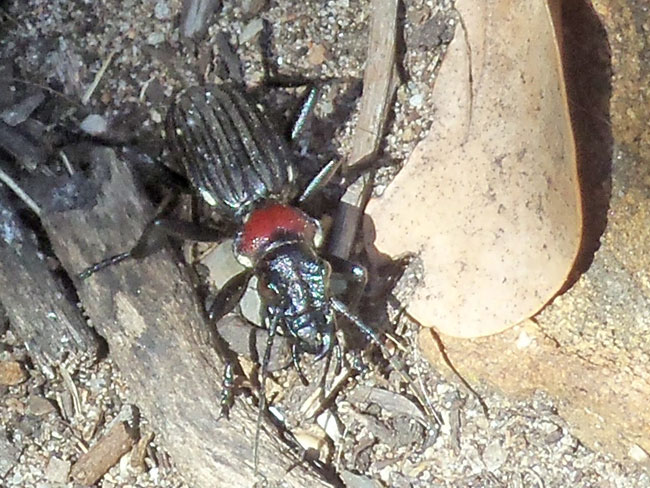 |
| A tombolo (the sandy spit linking a sometimes-island to the mainland). |
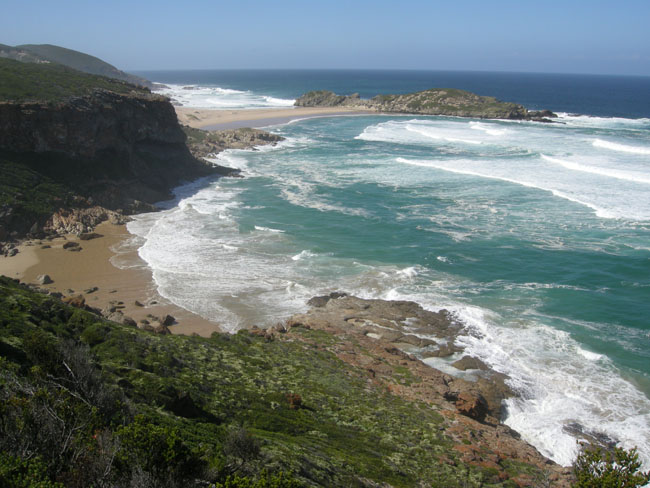 |
| And more great surf |
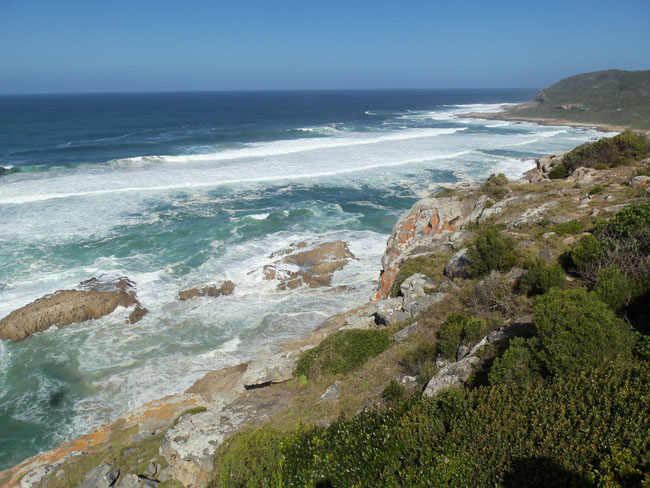 |
| A small museum had this and several other displays of what archaeologic finds in the area looked like when found in situ. |
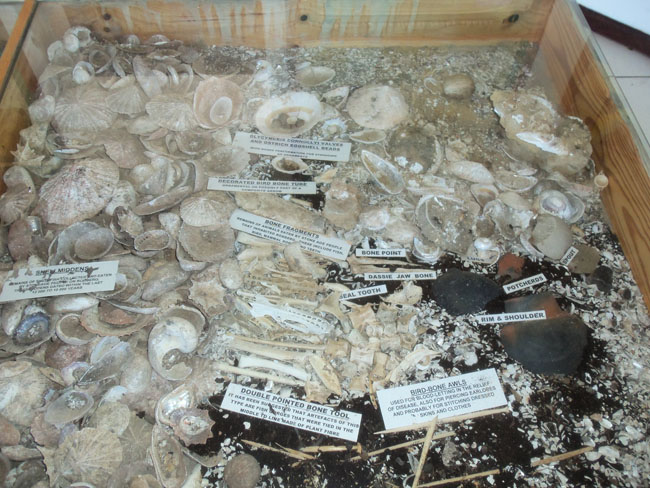 |
| Looking out the other side of the penninsula toward Plettenberg. |
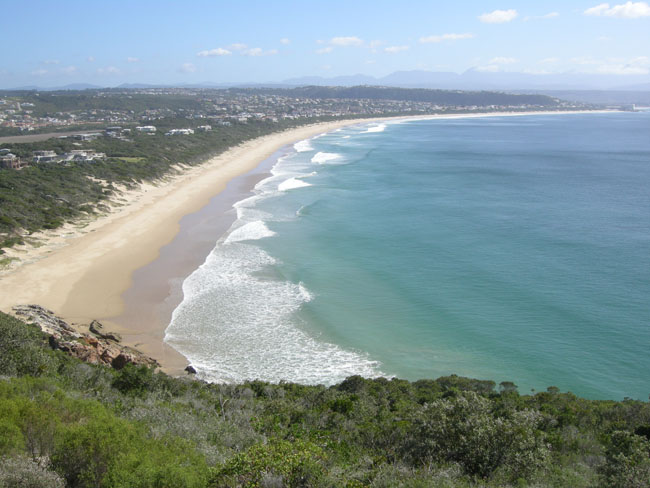 |
| Yet another stretch of beach |
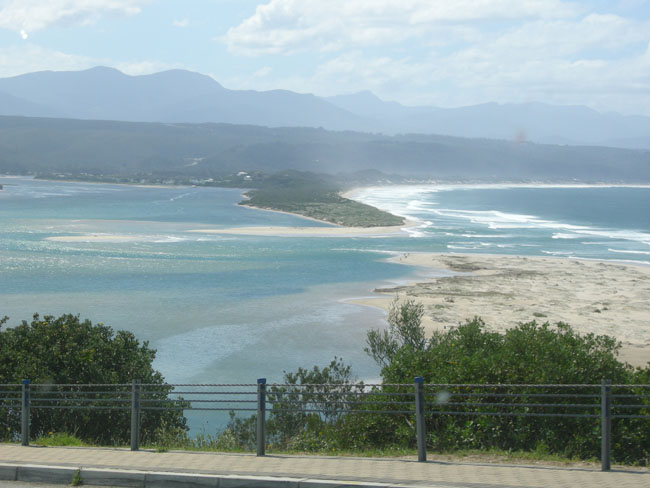 |
| As we approached "Nature's Valley", we encountered pedestrians. |
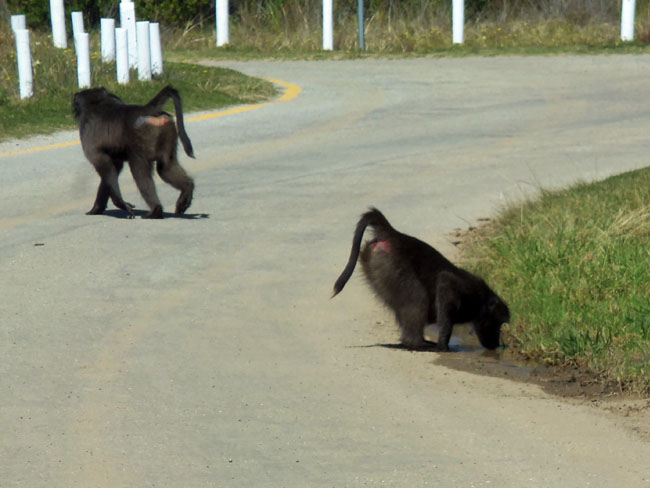 |
| A little later, a robin watched us lunch. |
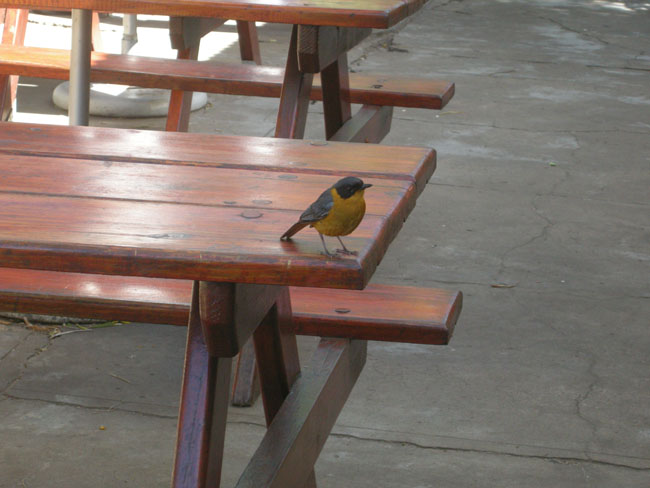 |
| Dick playing with the waves. |
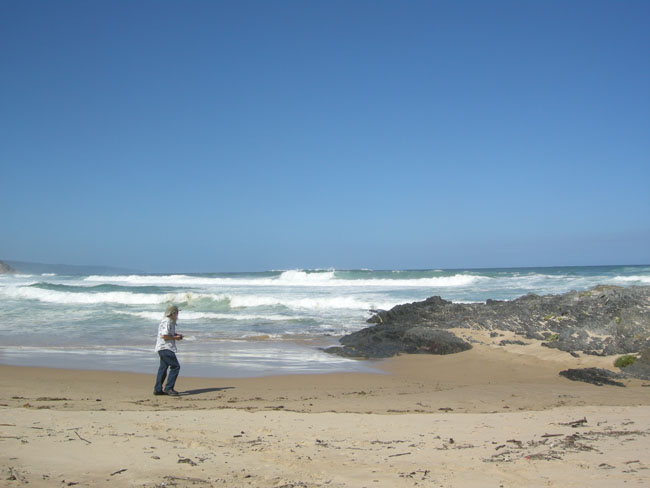 |
| Rejoining the N2, we drove up another headland |
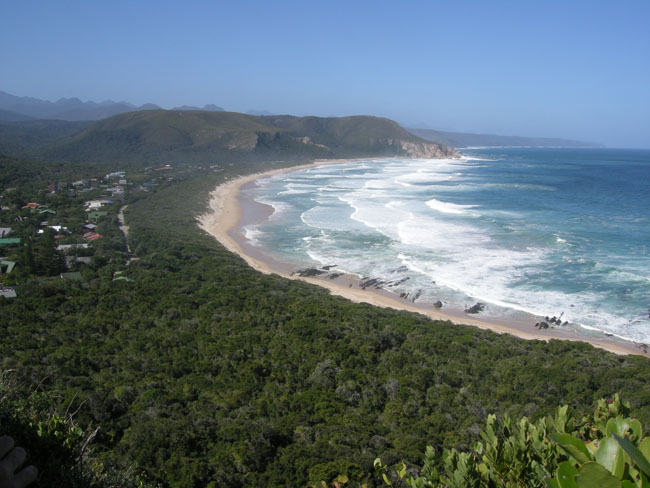 |
| and off to explore the forest |
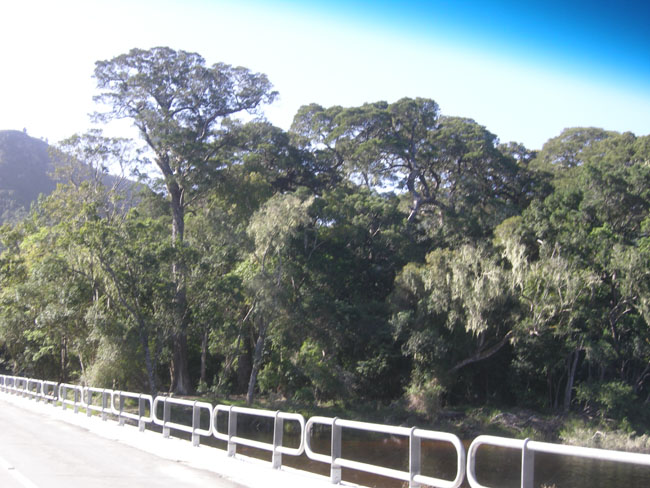 |
| with termites |
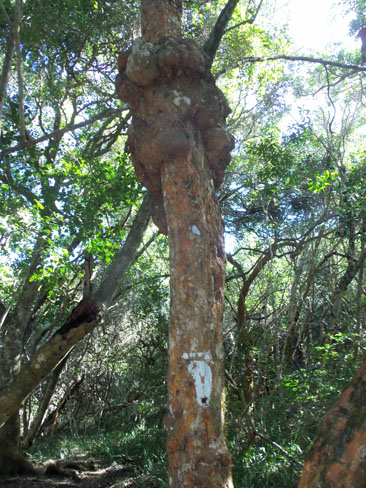 |
| and tall trees. |
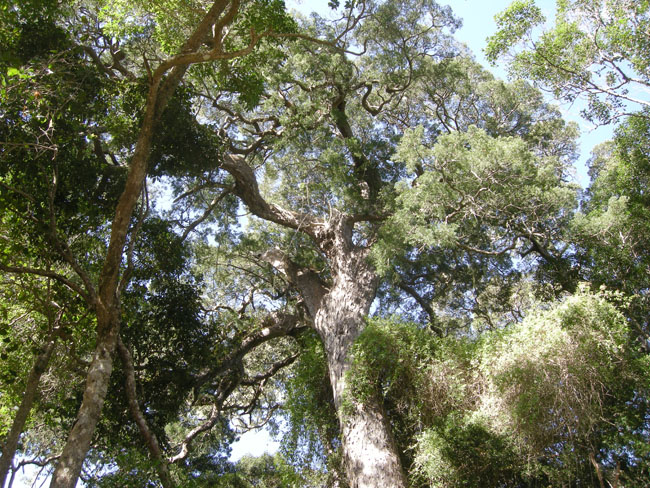 |
| Looking down into the the forested valley |
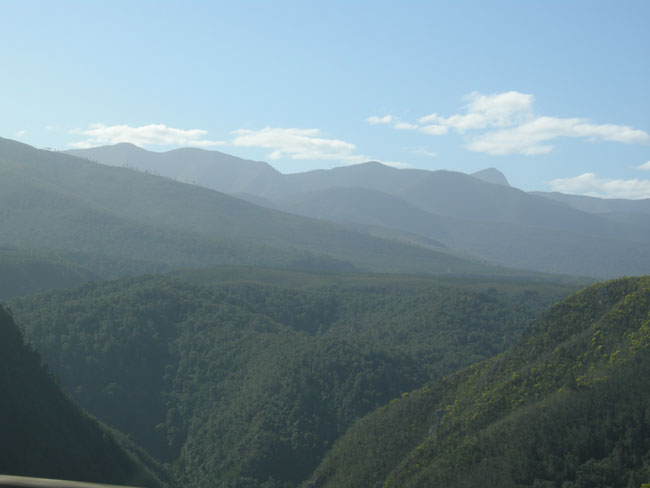 |
| We left the pavement to follow a gravel road south towards the sea, entering the Tsitsikamma section of the Stormsriver Mouth branch of the Garden Route National Park. |
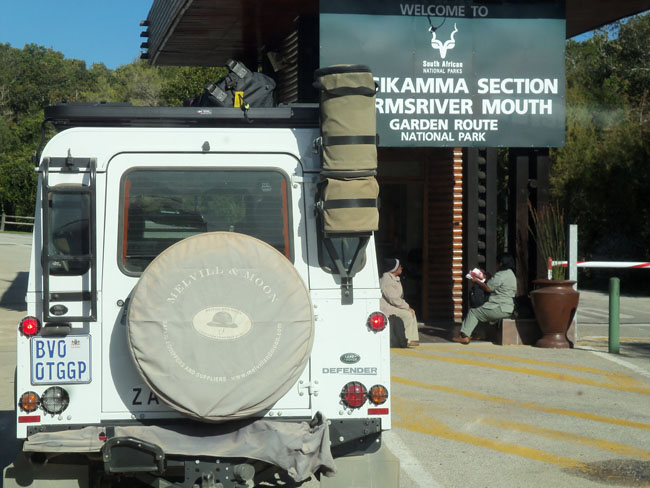 |
| Here's what yellowwood looks like (remember the big tree a few images back?) |
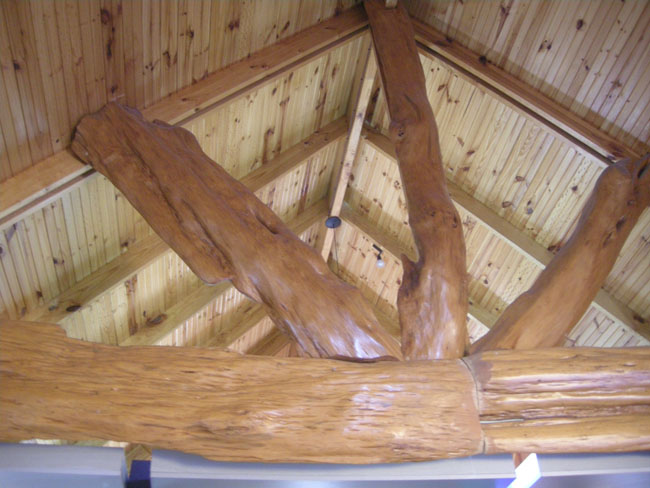 |
| This is the view from our campsite. |
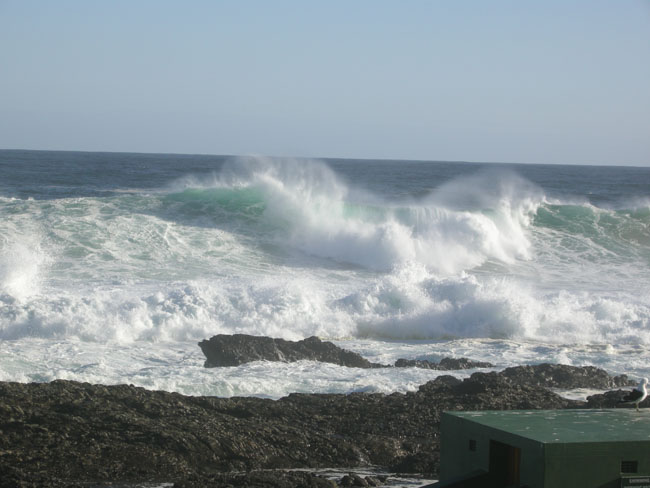 |
| and looking the other way at the ridge overlooking the shore. |
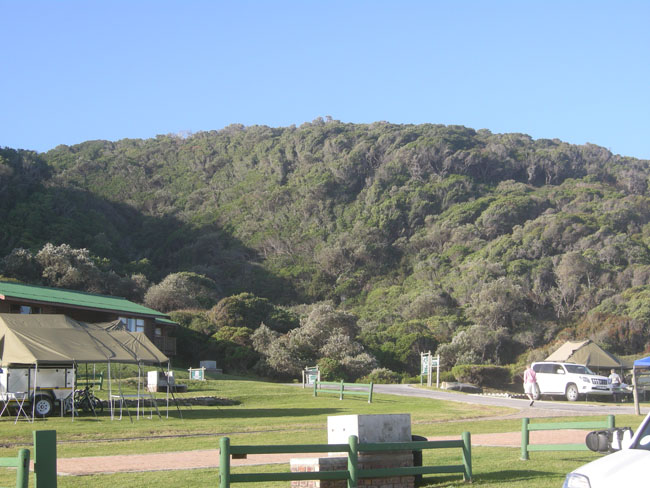 |
| With dassies looking back. |
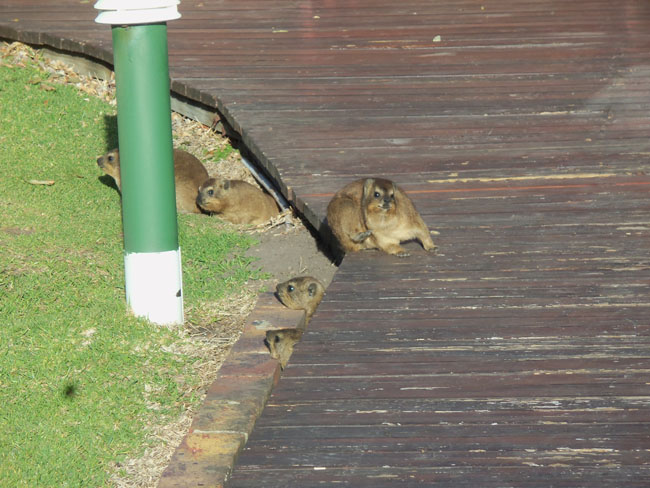 |
| Lots of surf. Our campsite was one of the ones fronting the surf, and we made good use of a hose to wash the salt off the windows the next morning. |
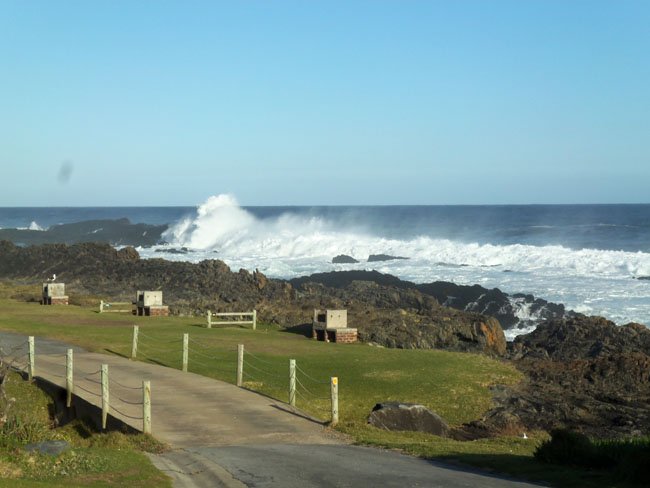 |
| The cliffs and road are slowly, and in this case not so slowly, eroding away. |
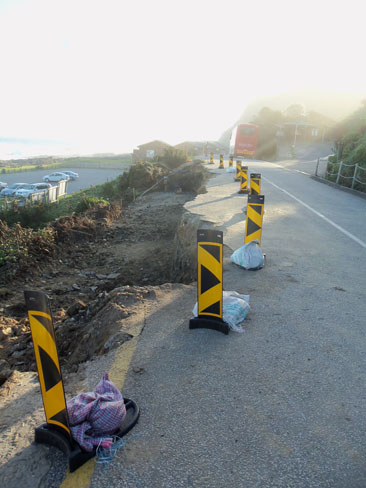 |
| Here's the actual Stormsriver mouth. |
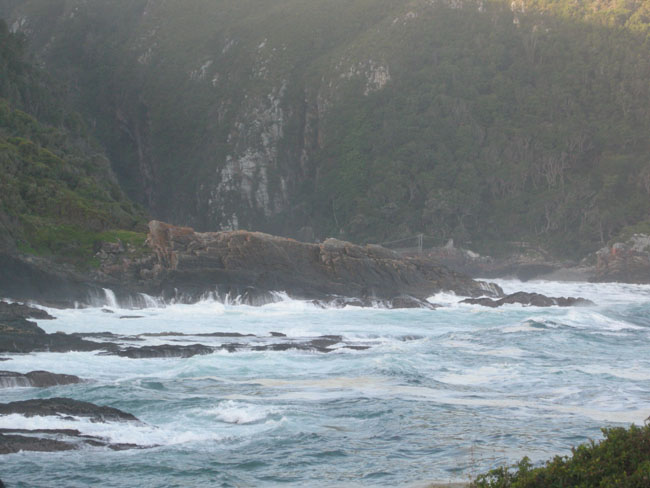 |
| We started taking the trail that led up further up the river, but again the winds and driven spray forced our retreat. |
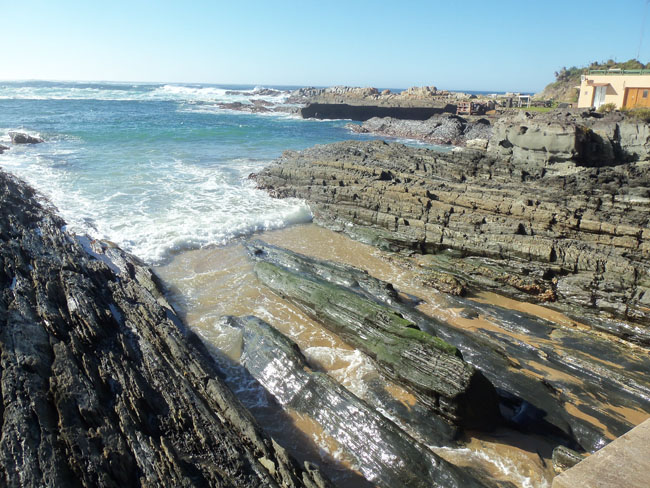 |
| We find some confusing signs (there was the faint shadow of a missing "un" on the far sign). |
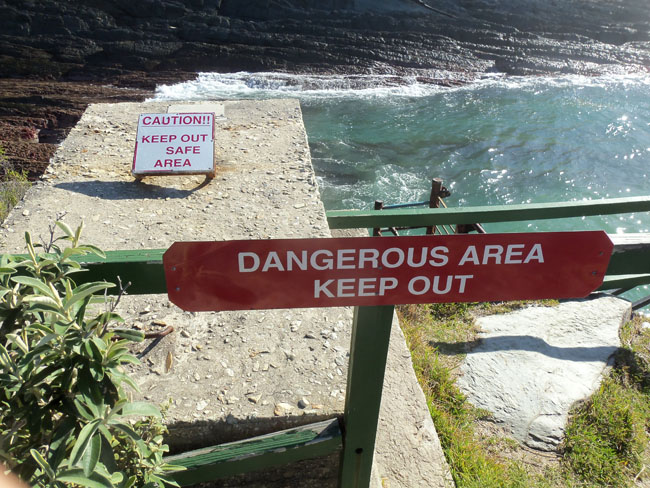 |
| We had a marvelous sunset |
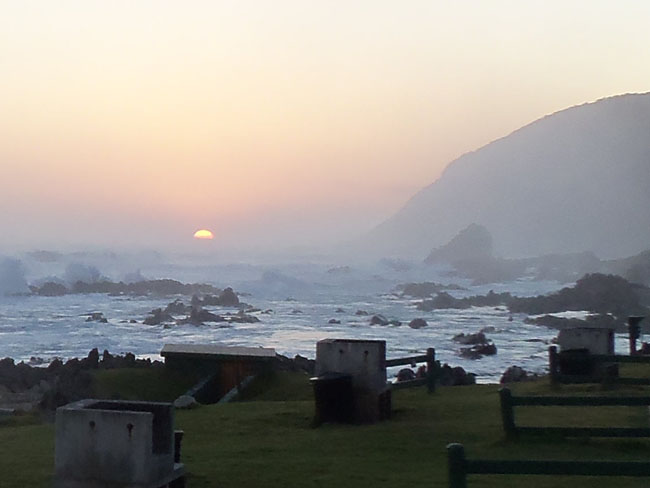 |
| and awoke to more beautiful waves (this is what I want to try to represent in a glass table). |
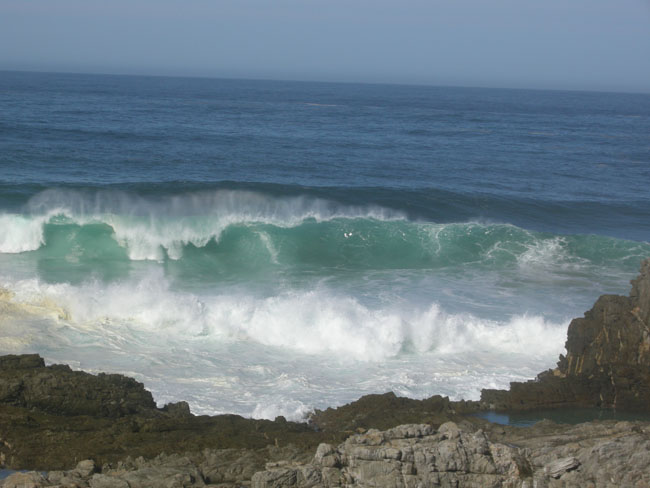 |
| One last glimpse before heading back inland. |
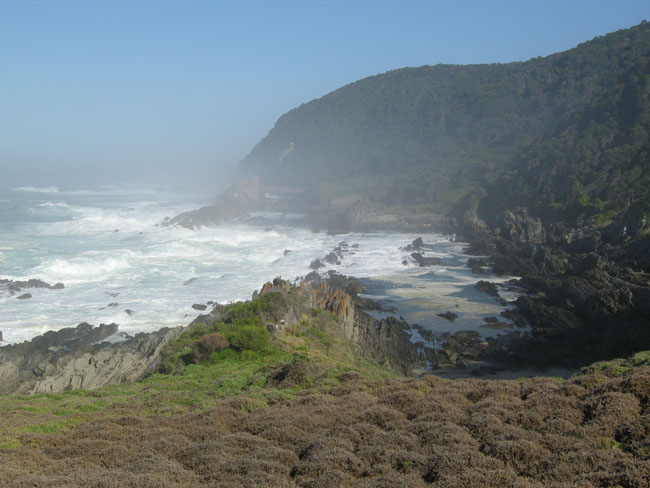 |
| In the town of Stormsrivier we suited up for a zip-line canopy tour. |
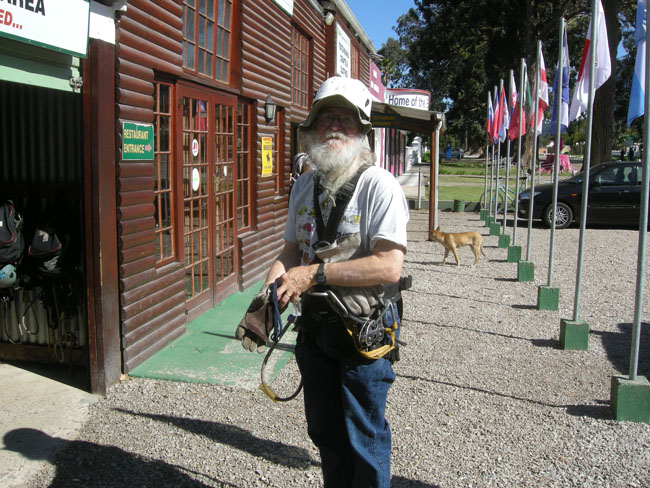 |
| Probably not the height of fashion but they assured me I won't fall out of the tree. |
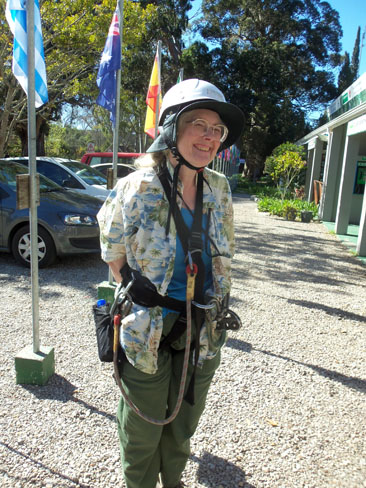 |
| The theory was that we'd watch the forest glide by underneath. Here's one of the other tourists. When it came Karen's turn, she was so concentrating on lifting her legs so she wouldn't run into the platform that she didn't look down. |
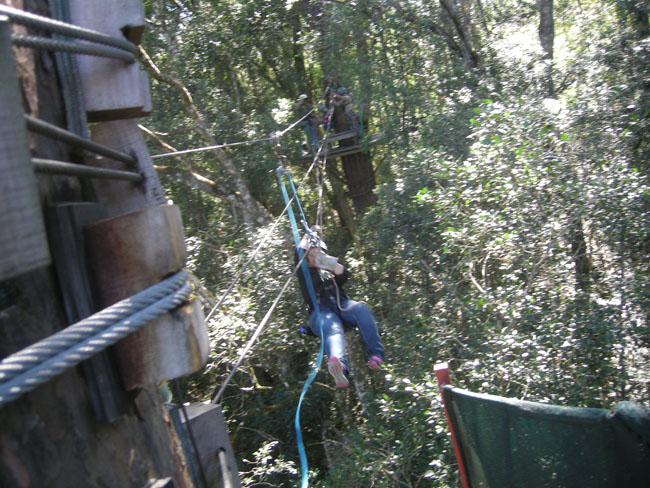 |
We did have plenty of time to look down from the platforms |
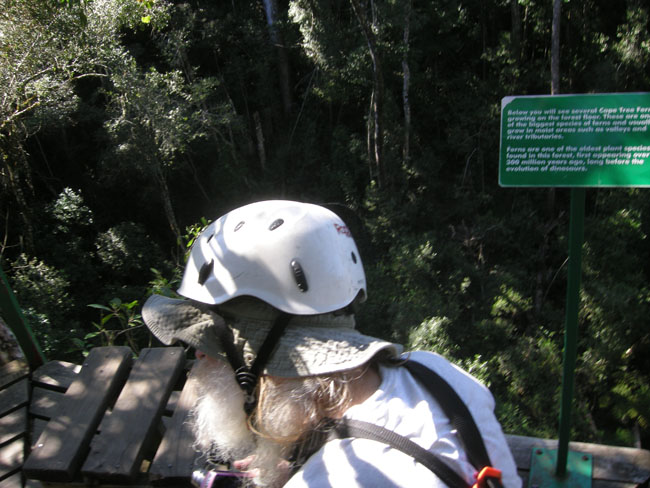 |
| They secure the platform to the tree in a way that the tree is not harmed. |
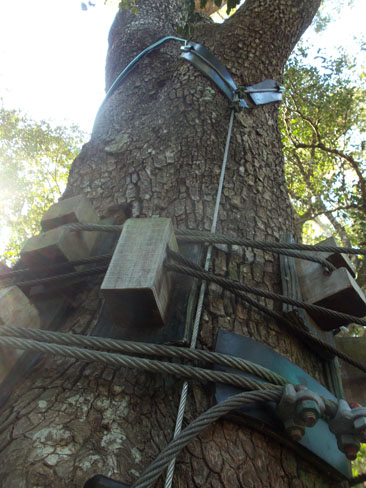 |
| We even got a closeup of some of the fauna |
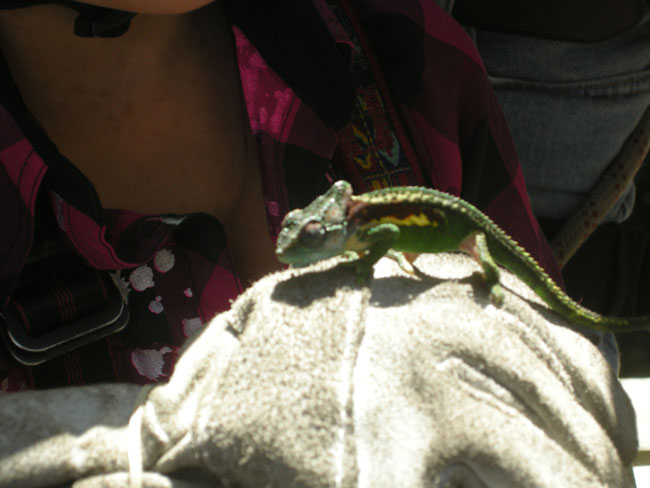 |
| And tree ferns! |
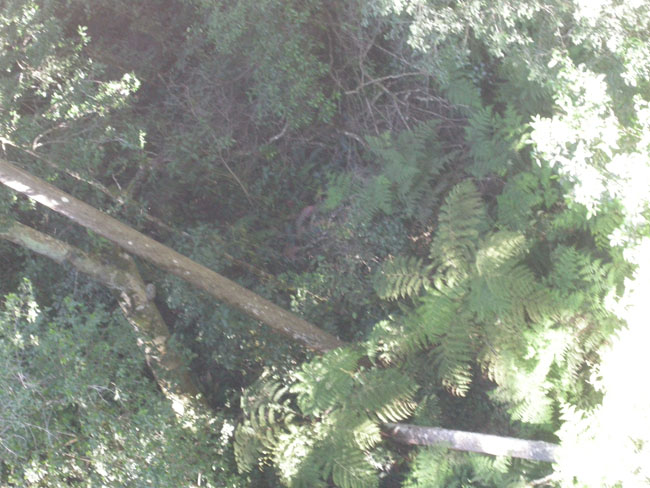 |
| Even here there is a beard-like lichen like we have in the Pacific NW |
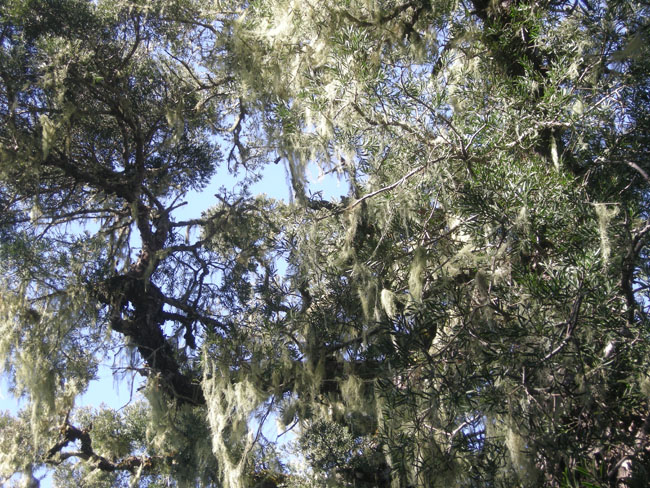 |
| And other colorful fungi |
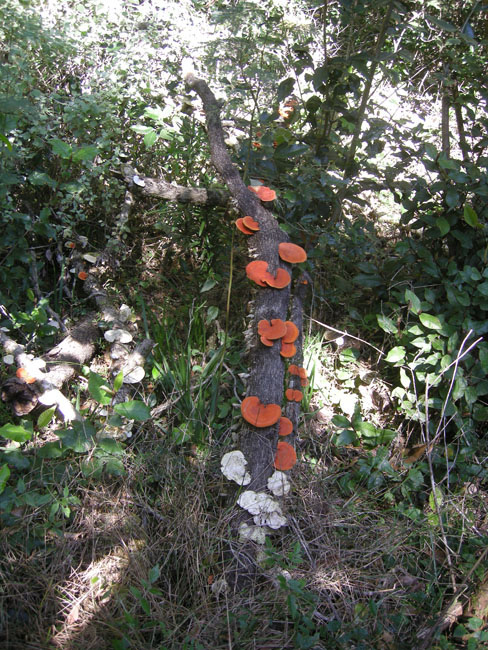 |
| Returning to VW firma, we buzzed (instead of zipped) eastward. Turning off the N2 at Humansdorp, we dropped back to the sea at Cape St. Francis. Greeting us was a reminder that ships do still travel around the Cape |
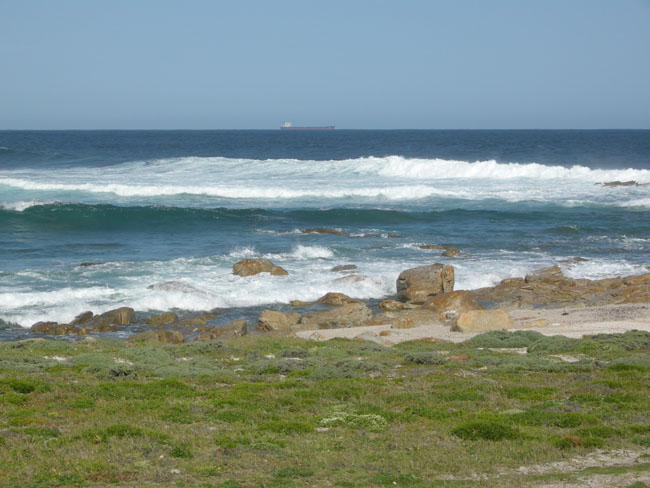 |
| And lighthouses are still needed. |
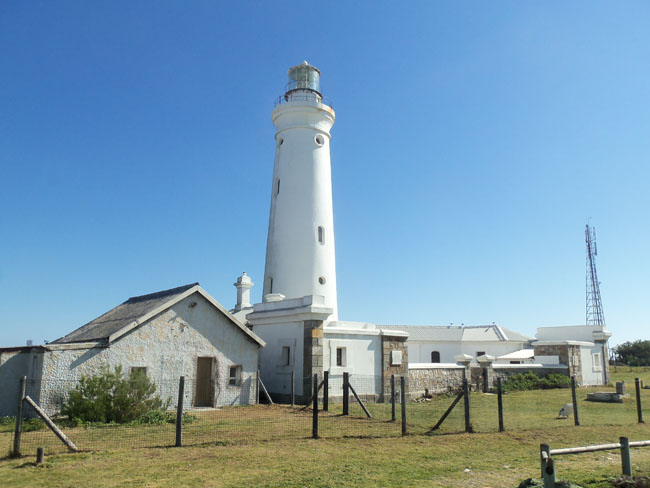 |
| Just in case you had forgotten our purpose for going: we were still seeing a few proteas even here. But the following beauties were in the Van Staden Reserve. |
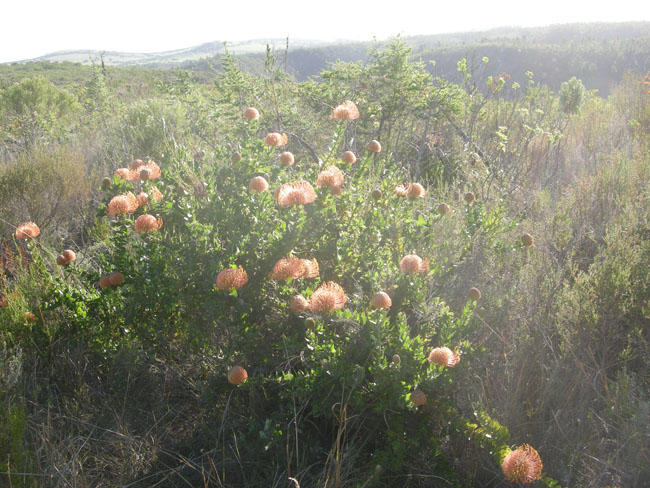 |
| |
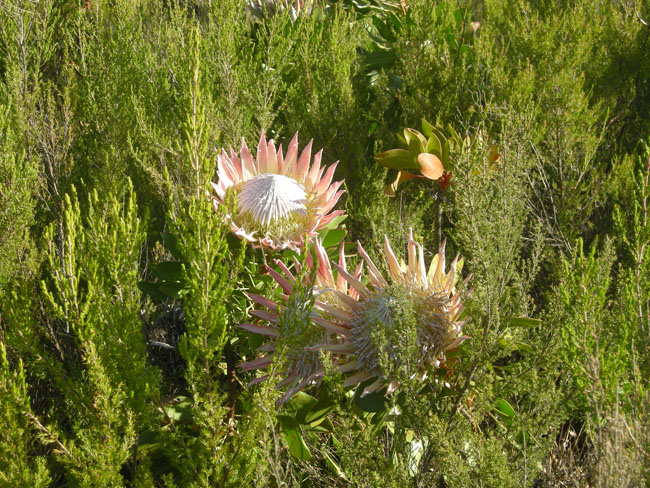 |
| |
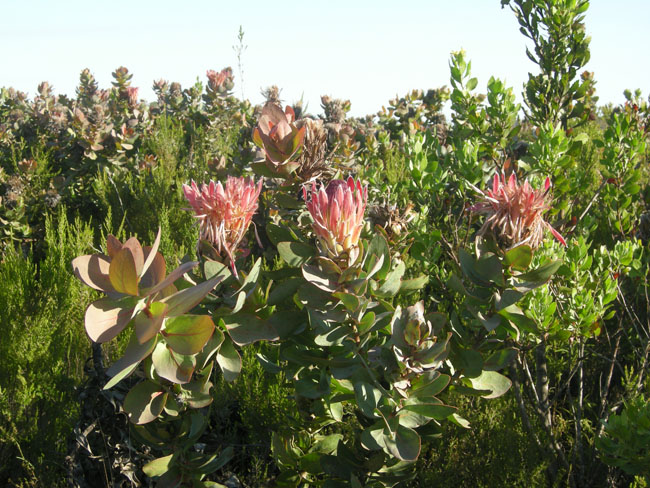 |
| A bit later, taking a very twisty road that climbed up down and around the hills between the N2 and the mouth of the Van Stadensrivier, we found one of the places the windmill blades were going. |
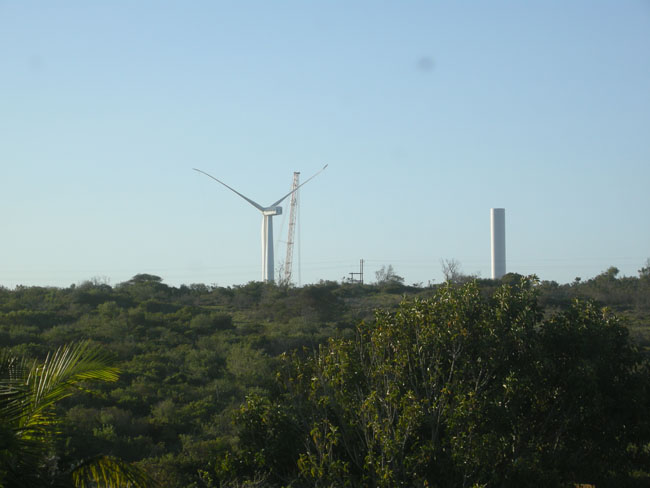 |
| The road finally topped one more saddle, and we drove down over a headland to camp in an almost deserted resort. |
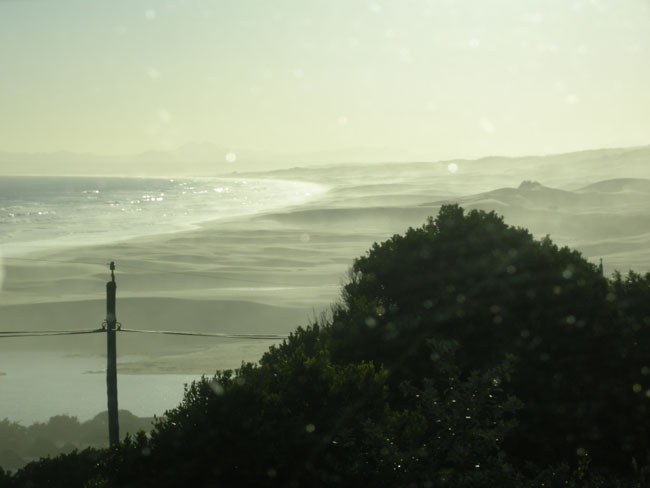 |
| |
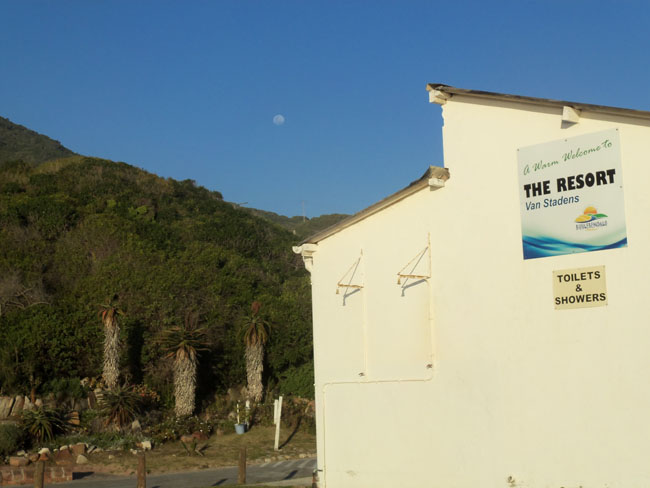 |
| Will the real tree please stand up! |
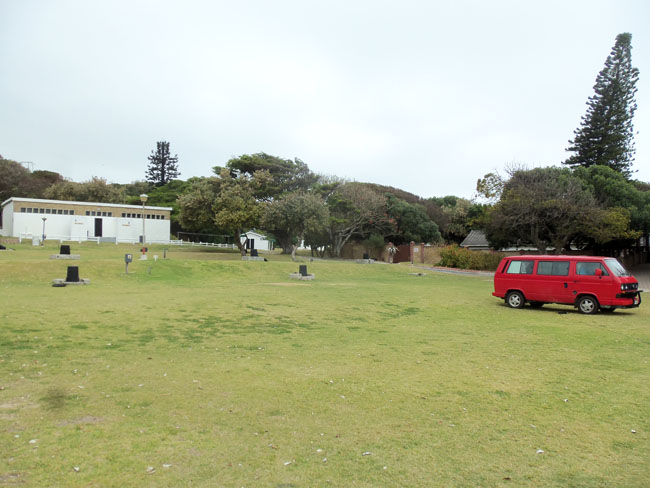 |
| For some reason we had great cell coverage in this out of the way place. |
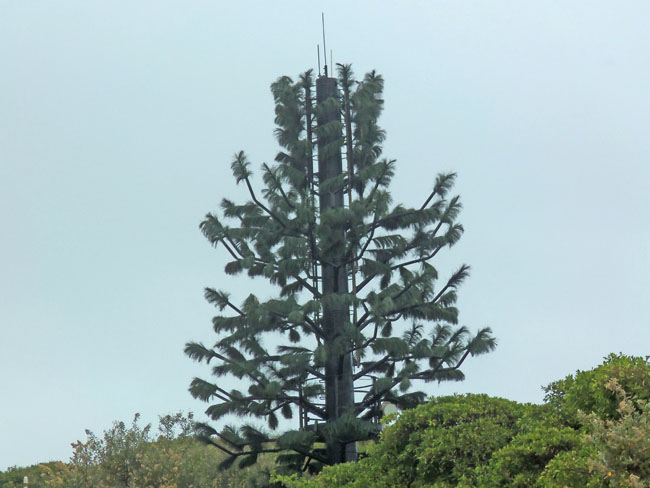 |
| But we were mostly walking the grounds, taking photos of the waves |
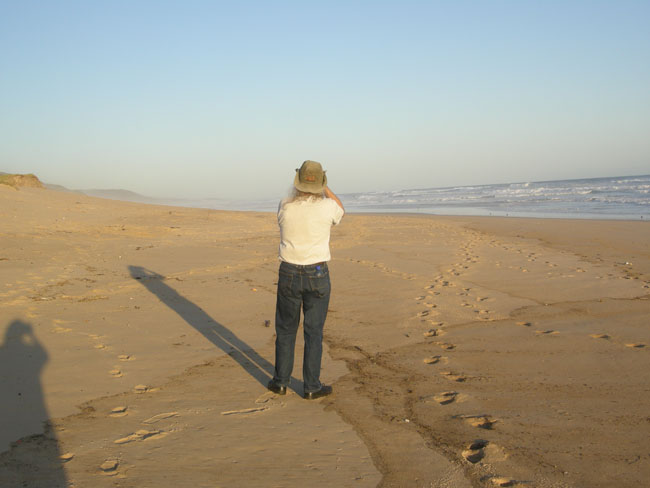 |
| of the dunes |
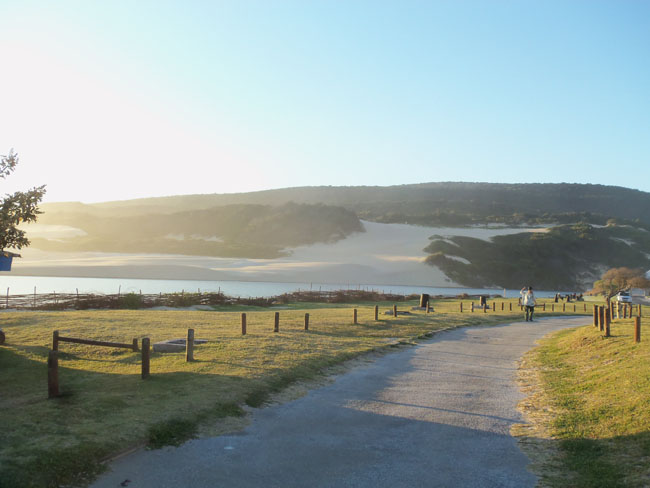 |
| and of the sunset. |
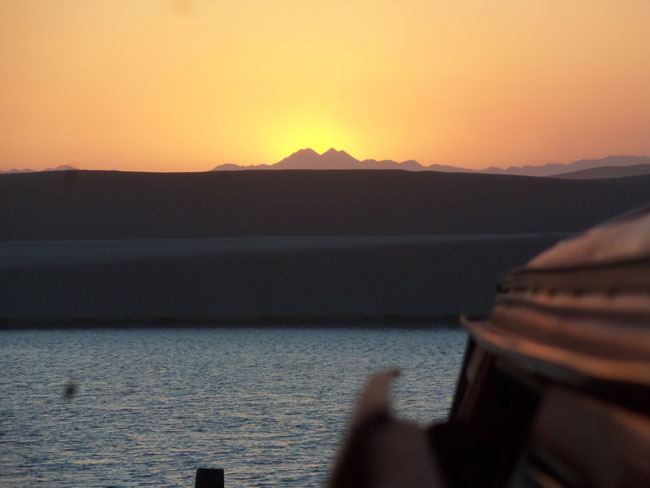 |
| Thw morning was gray but didn't rain |
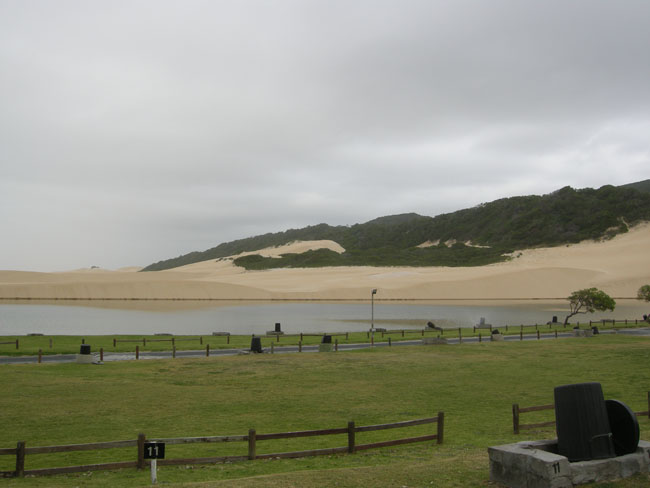 |
| We had to get out early because they were going to close the twisty (and only) road |
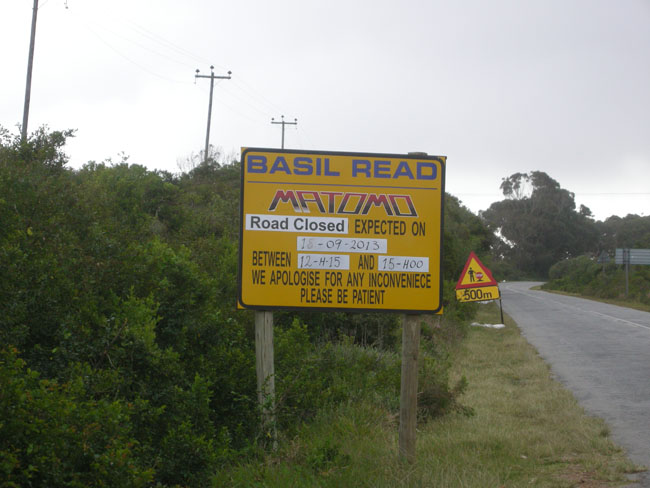 |
| ... to bring in more blades. |
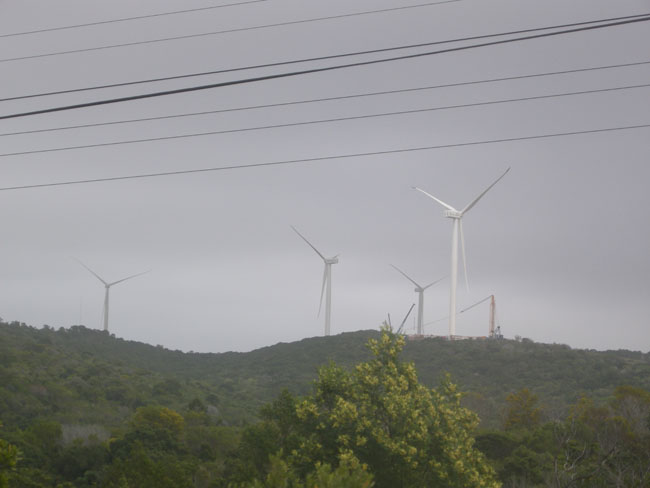 |
| Before noon we drove past Port Elizabeth (and its shipping) and turned inland, abandoning the ocean for the rest of the trip. |
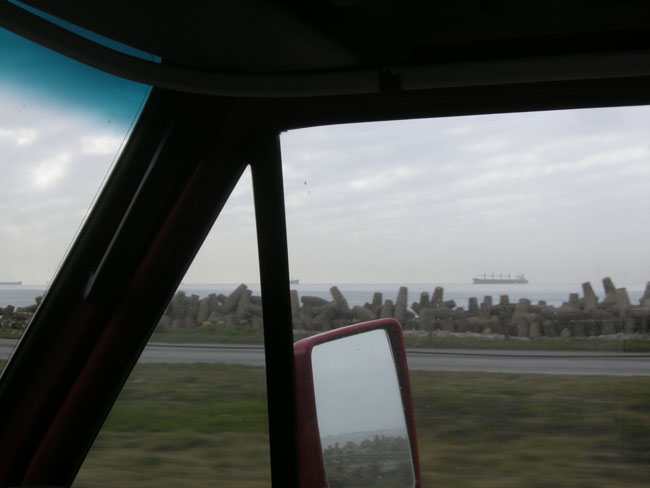 |



















































































































































































